
Dr. Karl E. Peace, a biostatistician, author, and philanthropist who has worked in public health for decades, has donated his 32-car collection to benefit Georgia Southern University. One of Dr. Peace’s previous contributions, an endowment in honor of his late wife, Dr. Jiann-Ping Hsu, allowed the university to establish a college of public health in her name.
Hagerty Marketplace is hosting the auction of The Dr. Karl Peace & Georgia Southern University Collection, the majority of which are Studebakers.
We can’t remember the last time we saw so many of South Bend’s finest under one roof. While there are a couple of post-Studebaker Avantis, a Chevy, a Buick, a Mercury, and a couple of Fords among the collection up for sale, let’s take a look at some of our favorite Studebakers that we’ll be paying particularly close attention to as the auctions come to a close starting on June 11.
1953 Studebaker Champion Regal Starliner

The 1953 model year marked the first year of the low, sleek Starliner coupes, penned by Robert Bourke at Studebaker’s design studio, which was headed by the legendary Raymond Loewy. Studebaker coupes of this era are a favorite among land speed racers because they perform much better than their peers, and it’s easy to see why: Their streamlined shapes were unlike anything else on the road. Later Studebaker Hawk variations expanded on the theme with fins and extra trim—we’ll be highlighting some of those as well—but the original Starliner is one of the best iterations and proves that sometimes less is more.

1957 Studebaker Golden Hawk

Studebaker’s most powerful and prestigious model at the time, the Golden Hawk debuted in 1956 with 352 cubic inches of Packard V-8 power, showing the fruits of the brand’s merger with Packard two years prior. For 1957, a Studebaker 289 replaced the larger Packard mill, but the output was the same 275 horsepower as before thanks to a centrifugal supercharger. These luxurious winged coupes are a rare treat, and because a 1956 model participated in the famed Mille Miglia, this one in particular could also be eligible for entry, adding another reason why a collector might see this Golden Hawk as the prize of Dr. Peace’s collection.

1960 Studebaker Champ Pickup

Studebaker didn’t have the deep pockets of its Big Three rivals, so it had to get creative in the late ‘50s when the brand needed to replace its aging pickup truck line that had been in service since 1949. Using the same chassis and stepside bed as its previous light-duty pickup, Studebaker cobbled a truck cab together by shortening a Lark sedan. We’ve gotta say, for something built on a shoestring budget, the styling works pretty well. 1960 marked the final year of a 170 inline-six as a flathead; it got an overhead-valve cylinder head in 1961. These pickups are a rare sight and would likely gather quite a crowd at any car show. Combine that with its fantastic gold paint and this one was an easy pick for our list.

1962 Studebaker Gran Turismo Hawk

The Gran Gurismo Hawk represented the final evolution of the sleek Starliner coupe into a more formal and stately touring car. The prominent grille might be a bit brash, but the new greenhouse gave the Gran Tursimo Hawk an all-new profile that matched its more upscale ambition. Inside, a plush interior kept up the theme. This one is powered by a 289 V-8 and a three-speed manual. Membership to the Brown Car Appreciation Society is complimentary.

1964 Studebaker Avanti

Plenty of Studebaker’s designs were vastly different from anything else on the market, yet we can’t help but think that the Avanti was perhaps the most ambitious effort the brand ever made. Its sleek fiberglass body is unmistakable. Studebaker-produced Avanti models were powered by 289-cubic-inch Studebaker V-8s, some with optional Paxton superchargers like the Golden Hawk. This one is naturally aspirated and backed by a four-speed manual transmission. Finished in blue over a blue and white interior, this example looks fantastic in photos, although a few mechanical and cosmetic issues need sorting out. It’s still a well-preserved example of a sporty personal luxury car bursting with style.

1964 Studebaker Daytona Convertible

Like the Champ pickup we mentioned previously, the Daytona used a lot of the mechanical underpinnings of its predecessor. In this case, that was the compact Lark, the same car that served as the basis of the Champ. Renowned designer Brooks Stevens was responsible for completely redesigning the Daytona to compete with rivals like the Dodge Dart, Chevy Nova, and Ford Falcon. We’d say he succeeded, as the lines look clean and sharp, even today. Just 416 Daytona convertibles were built in South Bend before production moved to Ontario, so this represents one of the last U.S.-built Studebakers in the company’s history.

There are plenty of other Studebakers in the Dr. Karl Peace & Georgia Southern University collection—plus the odd Chevy, Ford, and Buick. If you’ve got room in your collection for a bit of American car history outside of the Big Three, then you might consider one of South Bend’s stylish alternatives and help Georgia Southern University in the process.
***
Check out the Hagerty Media homepage so you don’t miss a single story, or better yet, bookmark it. To get our best stories delivered right to your inbox, subscribe to our newsletters.
The post 6 Stylish Studebakers up for Grabs appeared first on Hagerty Media.
]]>
Perhaps more than any other car company, Porsche faced enormous change in the period from 1960 to ’70. On the road, the seminal 356 gave way to the definitive 911, and Porsche finally went mass-market with the 914. The changes on track were even bigger.
At the beginning of the ’60s, Porsche raced the pocket-sized, class-competitive, four-cylinder 718. By the end of the ’60s, it had the 12-cylinder, all-conquering 917. The years in between saw a rapid succession of newer, better, faster prototype racers. The 908 was one of them, and it wound up being among the most successful and versatile race cars Porsche ever built. Which really is saying something. Among those 908s, this 908/02 Spyder, up for auction next week, has one of the best résumés of any 908.

In 1968, with the FIA changing the displacement for its Group 6 prototype category to an F1-sized 3 liters, Porsche further developed its 907 (a 2.2-liter car) and adapted it to accept a new 3.0-liter unit. They called the new racer, naturally, the 908. Air-cooled and with two-valves per cylinder, its new flat-eight made about 350 hp for most of its career, and although this was less than the output from some of its F1-derived competition like Ferrari and Matra, the Porsche eight was meant from the get-go to last a full endurance race, not just a relatively short Grand Prix. The 908 was also a very light car, typically less than 1500 pounds.
Early 908s were streamlined longtail coupes. They were drop-dead gorgeous but also unstable at speed, terrifying to drive, and prone to numerous teething problems. Regular aerodynamic tweaks with flaps and appendages changed the 908’s appearance drastically in a short time, but the results for it in the 1968 season were mixed, although Porsche did finish second in the World Sportscar Championship.

In 1969, Porsche was forging ahead with the brand-new 917, but nevertheless further developed the 908 into the 908/02, which was not a coupe but an open short-tail spyder. As it did the year before, Porsche continually tweaked the 908’s bodywork for better aerodynamics. One of the most important trips to the Stuttgart wind tunnel resulted in the Flunder (Flounder) body, nicknamed for its flatter, fishier appearance, including the nearly enclosed passenger area. The new shape debuted at the Nürburgring 1000km and won, notching Porsche’s third straight victory at the event. Porsche also won the World Sportscar Championship in 1969, mostly thanks to the 908, although one of the longtail coupes finished just 120 meters behind the winning Gulf Ford GT40 at Le Mans.
A new version, the 908/03, debuted for 1970, with Porsche aiming to use the more nimble 908 on tracks less suited to the powerful 917. The two-car strategy worked, and Porsche won the World Sportscar Championship in both 1970 and 1971. Rule changes for 1972 left the 5.0-liter 917 effectively banned, and the 3-liter category became the fastest class, but Porsche nevertheless sold off its 908s to customers. Remarkably, a privately entered 908 finished third at Le Mans in 1972, and others were competitive into the early 1980s, by then running turbocharged engines. At the Nürburgring 1000km, a Porsche 908 took the checkered flag in three different decades—four straight wins from 1968–71, and again in 1980.


This 908, chassis 908/02.005, started out as a factory 908/02 spyder. It first raced at Sebring in 1969, then was used as a training car for the Targa Florio, which Porsche won. Later in the year, it went to the Martini International Racing team and for the 1970 season got the more enveloping Flunder bodywork. It raced at Sebring, Brands Hatch, Monza, the Targa Florio, and Spa, where it notched a class win.
For Le Mans, its shape was further revised with longtail rear bodywork better suited for Le Mans’ high average speeds. It was also fitted with a transmission oil cooler (an overheated gearbox forced another Flunder to retire from Le Mans the year before). The Martini team fielded a single 917, done up in its famous blue and green psychedelic livery, along with 908/02.005 plus another 908/02. That other 908 crashed in qualifying, though, and 005 started the race way back in 22nd place. Drivers Rudi Lins and Helmut Marko piloted the spyder quickly and consistently, however, and by midnight they were up to sixth place and leading their class. By late the next morning they were a remarkable second place overall. A wheel nut stuck during two consecutive pit stops and cost precious time, but by the end of the 24-hour slog, they crossed the finish in third overall, still first in class, and won the Index of Performance, an award for efficiency. Martini’s other car, the hippy-fied 917, finished in second. Not bad for a team that had only started racing in 1968. The overall win, of course, went to the Porsche-Salzburg team’s 917, marking Porsche’s first overall win at Le Mans. This 908 was a big part of that effort, and it is even shown in a few scenes from Steve McQueen’s 1971 movie Le Mans as well.


908/02.005’s racing career stopped after its Le Mans triumph, and the car went into several Swiss race car collections before being acquired by noted Porsche collector Julio Palmaz, who also owned the Porsche-Salzburg 1970-winning 917. After going to the current owner in the 2010s, 005 has had significant restoration work, including a complete rebuild of the engine, to get it race-ready.
Porsche built barely 30 908s of all types, and they’re coveted both for their historical significance and for being usable vintage racers, so they don’t pop up for sale often. A longtail coupe sold last June for €1,885,620 (about $2M), and another 908/02 factory car with a similar resume but no Le Mans win sold in Monterey two years ago for $4,185,000. A 908/03 also sold at Monterey in 2017 for $3,757,000, and Bonhams sold this very same 908/02.005 10 years ago for £2,185,500 ($3.4M). This time around, it’s the headline car of the all-Porsche Air|Water auction, and has a presale estimate of $4.75M–$5.75M.

***
Check out the Hagerty Media homepage so you don’t miss a single story, or better yet, bookmark it. To get our best stories delivered right to your inbox, subscribe to our newsletters.
The post This Porsche 908/02 “Flunder” Never Floundered appeared first on Hagerty Media.
]]>
The loss of Ken Block and his larger-than-life personality has been a void in car culture for more than a year now. If you’re looking for a little extra to bring some of his signature style to your garage or office, without requiring a television playing his videos on perpetual loop, eBay just listed 43 pieces of Ken Block memorabilia, and all proceeds are slated for the 43 Institute, a nonprofit established in the wake of Block’s death.
The items available include some real heavy-hitters from Block’s career. There are some signed prints, posters, and books, but the real interesting stuff are the wheels and other parts-turned-scrap-metal that were once affixed to one of his cars. For example, the front splitter from the Hoonicorn Mustang is one we expect to be popular. This small piece of the Hoonicorn was damaged during the filming of Gymkhana 7 and has the scars to prove it.
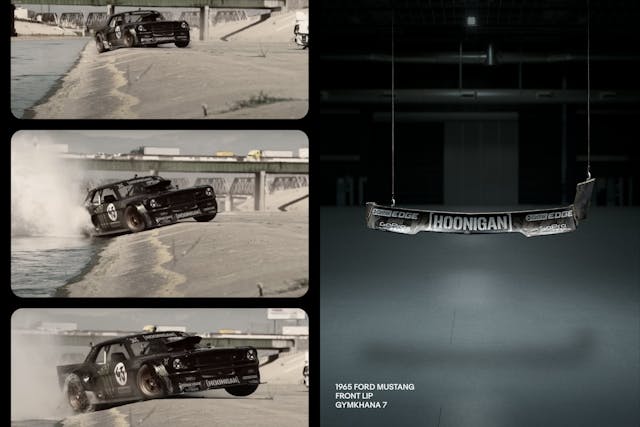
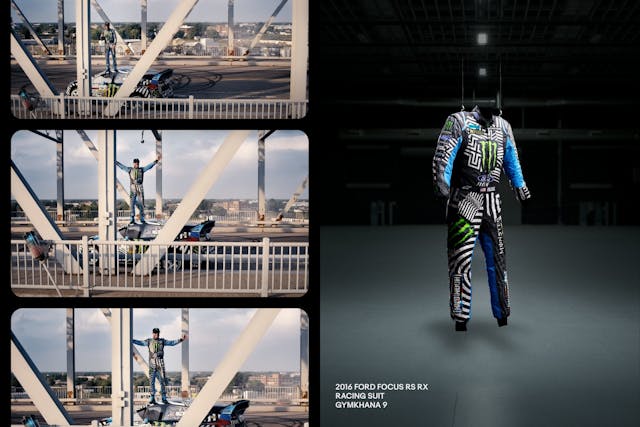
Other highlights include a race suit from Block’s 2016 season, the burned-up clutch from the Climbkhana: Pikes Peak video, and even the rear gearset from the Hoonicorn, along with what seems like a wheel from just about any interesting car Block drove over the years. He knew how to put on a show, but man, from the looks of it, he was hard on parts.
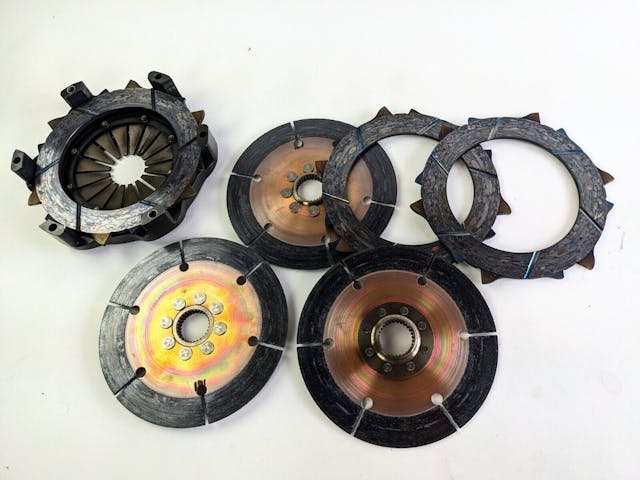
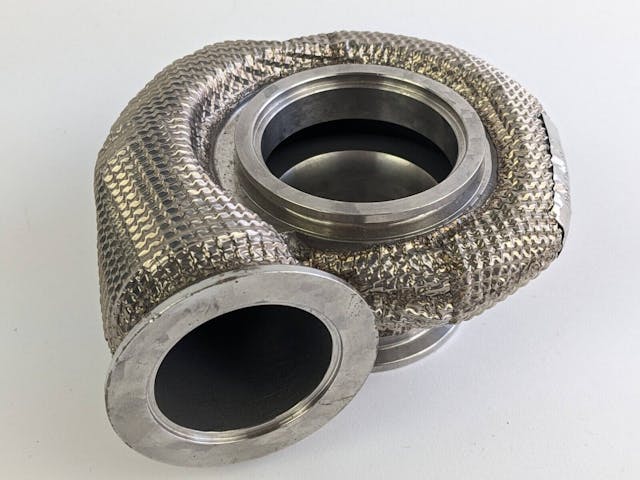

The parts for sale, like the turbocharger housings from the rally cars Block raced over his career, all trace to a car with the number 43 on the side. And it is now firmly a part of the foundation created in his honor. The mission of the 43 Institute is to further the ambitions of those seeking careers in action sports, motorsports, and the creative arts. Block’s dream of igniting and fueling a passion in people to continue the automotive hobby will be felt for years, but these auctions are only around for nine more days.
The post 43 Chips off Ken’s Block Are Selling to Benefit Charity appeared first on Hagerty Media.
]]>
There’s a chapter in the story of the Group B homologation special 959 that Porsche would rather be not there at all. In fact the German sports car maker did everything it could to avoid it.
The 959’s awesome all-wheel-drive system proved its potential by winning the grueling Paris-Dakar rally outright and coming first in class at Le Mans in 1986. Even though the cancellation of the Group B category meant it could no longer race Porsche had committed to building around 300 examples and, across the world, Nissan was watching.
The Japanese firm was working on an all-wheel drive system of its own and a close-up look at the 959’s drivetrain would certainly speed things along. With its traditional Japanese respect for proper process and decorum Nissan initially attempted to order a car direct from the factory, but, after Porsche rejected it, Nissan took a more Ninja-like approach. The car—a 1988 959 Komfort, chassis number 022—was eventually bought by an intermediary from Belgian distributor D’Ieteren Brothers and then shipped to Yokohama for study.
Nissan never registered the car in Japan, instead disassembling it to discover its intricate inner workings. By 1987 Nissan had perfected its Advanced Total Traction Engineering System for All terrains and Electronic Torque Split (ATTESA-ET-S) and installed it in the R32 GT-R. In race trim the GT-R won every All-Japan Touring Car Championship race from 1990 to 1993 and a legend was born.



With no further use for the 959, Nissan put it back together and sold it to a Nissan engineer who also refrained from registering it. Eventually the 959 found its way to the U.S.A. where, in 2019, the owner took it to specialist Bruce Canepa for a transformation under his “959 SC Reimagined” program. It took four years, 4000 hours, and $950,000 to convert the car, much of which went into upgrading the 2.8-liter twin-turbocharged flat-six engine from 444 hp to more than 800 hp. It’s now said to be capable of reaching 60 mph from a standstill in 2.5 seconds and topping out at over 230 mph.
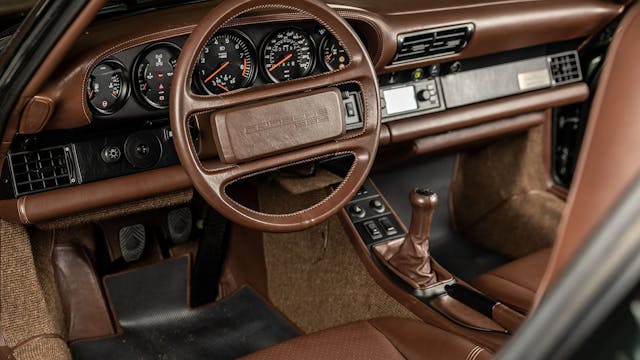
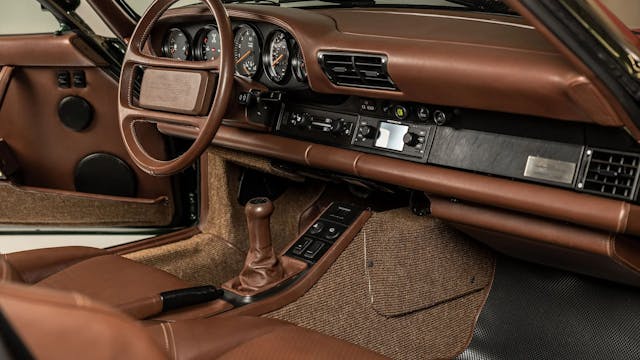
The original shade of Oak Green paint and gunmetal gray for the 18-inch wheels were retained but the cabin was re-trimmed in tobacco brown leather with matching square-weave carpets modeled on those of the Porsche 356.
This remarkable car with an even more remarkable backstory will be for sale at Broad Arrow’s Amelia Auction on February 29 where it’s estimated to fetch up to $3.75 million.
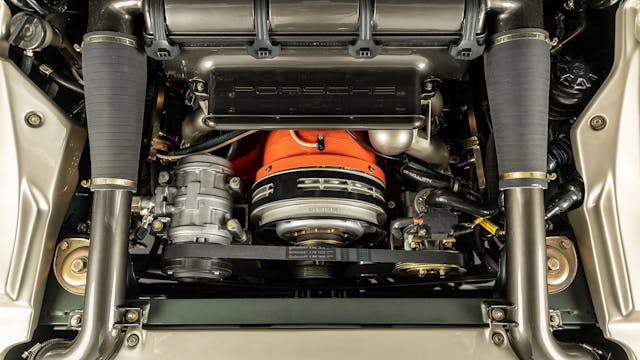
***
Check out the Hagerty Media homepage so you don’t miss a single story, or better yet, bookmark it. To get our best stories delivered right to your inbox, subscribe to our newsletters.
The post Without This Porsche 959 There Would Be No Nissan GT-R appeared first on Hagerty Media.
]]>
Millennials and Gen Zers might say the front end on this Range Rover has a cyberpunk look, based on a recent revival of interest in the visual genre. And with its genesis in the late 1970s, this Rangie even arrived around the same time as science fiction media like Judge Dredd first brought the concept to life.
But as the extensive patina and slightly disheveled look of this 1977 Wood & Pickett conversion suggest, the ‘Sheer Rover’ that sold online through Bonhams for $27,700, including fees (£21,951), comfortably over its $19,000 upper estimate, is firmly rooted in the past. And it has a previous famous owner to prove it.
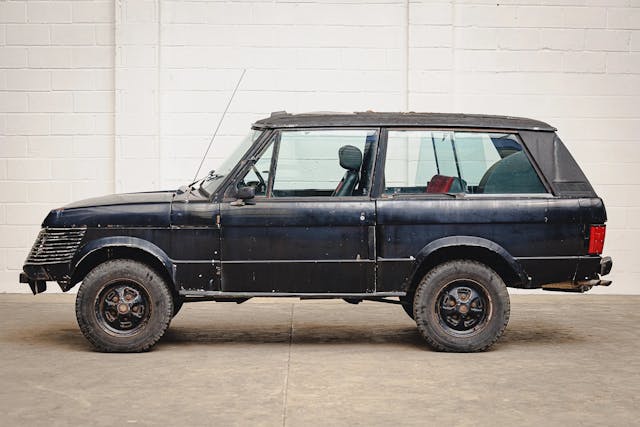
That owner was Peter Sellers, known in automotive circles almost as much for his spectacular taste in motive metal as his acting and comedic roles. Over the years, Sellers owned everything from the de rigeur celebrity choices of Rolls-Royce and Jaguars, to a Ferrari 250 GTE, a Bristol 407, and a Buick Riviera.
Sellers is also known for his distinctive Radford-converted Mini with its wicker-style sides, but for the Range Rover he bought in 1979, he went to another well-known coachbuilder of the era, Wood & Pickett. Known as the Sheer Rover and developed in conjunction with British department store Harrods, the car was delivered to Sellers at his home in Gstaad, Switzerland, but he owned it for only a short period before his untimely death in 1980, aged 54. Since then, it has been in the ownership of one family.

Unusual nose aside—with its surprisingly 1980s-style angled grille covering the traditional Range Rover front end down to the bumper—the exterior is otherwise much as Range Rover designed it, though at one point it did wear polished Wolfrace alloy wheels, which are decidedly un-Range Rover. The similarity should make restoring it a little simpler, with plenty of specialists out there only too willing to revive these classic 4x4s.
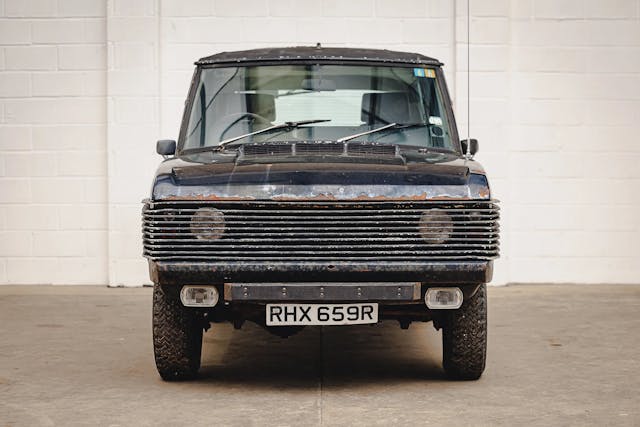
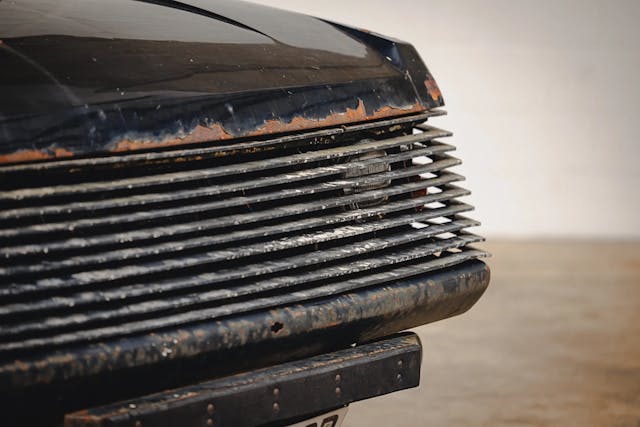
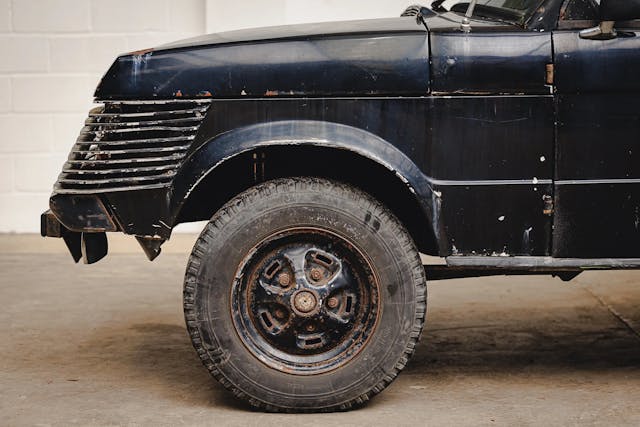
The interior, however, is rather different, from its red Draylon-trimmed Recaro seats to the extended dashboard top incorporating extra dials, extra vents, and stereo equipment. Down by the driver’s side is a distinctly 1970s-looking Pioneer graphic equalizer panel.
The car’s history file includes recent bills for just shy of $3800 (£3000) to get it running and driving, but it’s not yet ready for the road, so should the new owner want to get it going properly before any kind of restoration, they’ll need a deep breath and a willing bank manager.
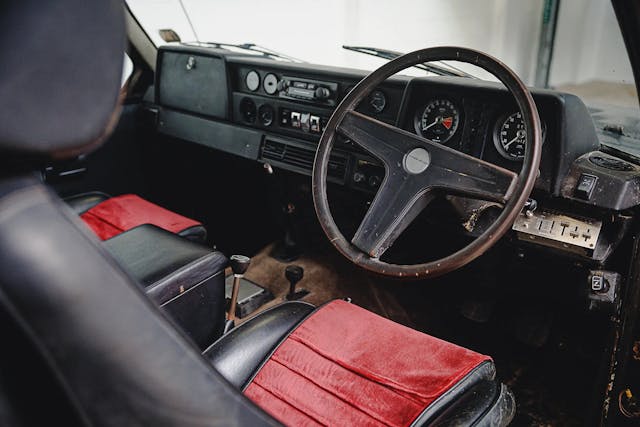
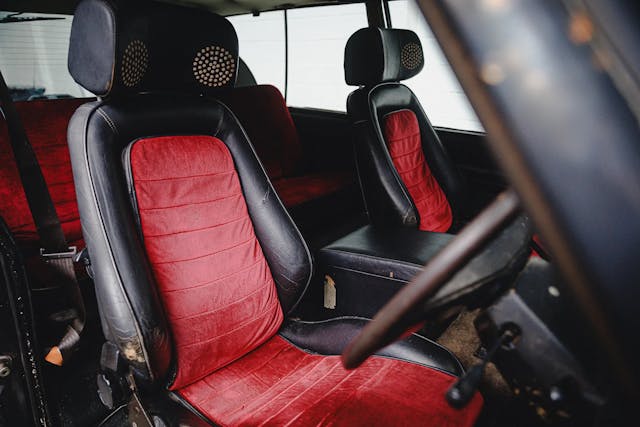
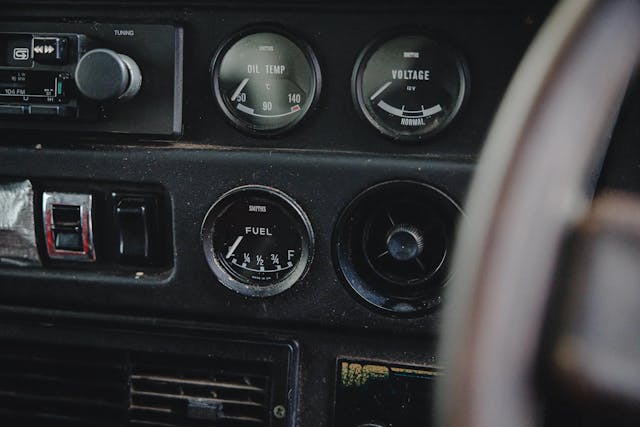
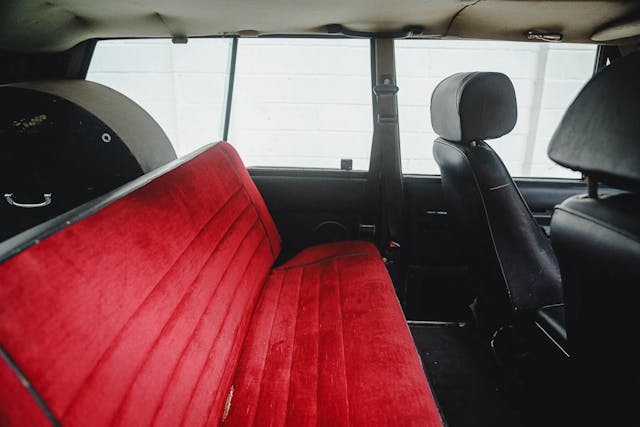
Wood & Pickett’s experience with the Sheer Rover subsequently led to the development of an ‘In Vogue’ special edition—a name that might sound familiar, since Land Rover has offered Vogue trim on its Range Rovers ever since.
No modern Rangie looks like this one, though. Maybe it’s time to get on the phone to Jaguar Land Rover chief creative Gerry McGovern and suggest he looks to Judge Dredd, Blade Runner, and Akira for some stylistic inspiration.
***
Check out the Hagerty Media homepage so you don’t miss a single story, or better yet, bookmark it. To get our best stories delivered right to your inbox, subscribe to our newsletters.
The post This Wood & Pickett Range Rover Will Take Sheer Guts to Restore appeared first on Hagerty Media.
]]>
With enough money and time, it’s possible to fix almost any car, no matter how rare or valuable. Break a tiny piece of unobtanium plastic trim, and there’s probably someone out there who can 3D-print a new one for you. And if you stick your McLaren F1 into a ditch, then McLaren itself will be only too happy to build you a new carbon-fiber tub.
Even so, repairing the old fiberglass body of a classic race car can involve a lot of trial and error. Unless, that is, you have the original molds—and if you have a Lola in your collection, then you may well want to keep an eye on this upcoming W&H Peacock auction in the U.K.
The collection of molds and fiberglass tools covers several race-car bodies constructed by Lola from the 1960s to the 1980s, including the Lola Mk1, Lola T70 Mk2, the Lola T70 Mk3 and Mk3 B, and a selection of other single- and twin-seat bodies.
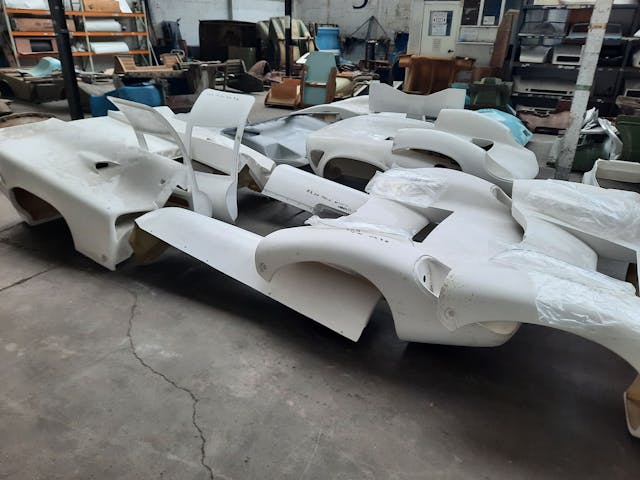
The molds are used to standardize the manufacture of the fiberglass panels used on the cars, ensuring each one is as close as possible to the last. More importantly, the fact that they survive means that skilled modern hands can, in theory, create a body as good as identical to the original models from the 1960s.
As well as the molds, which cover everything from panels and smaller components to nose cones, the auction listing includes plenty of other related tools and equipment from T W Mouldings (TWM), the British fiberglass specialist pending liquidation.
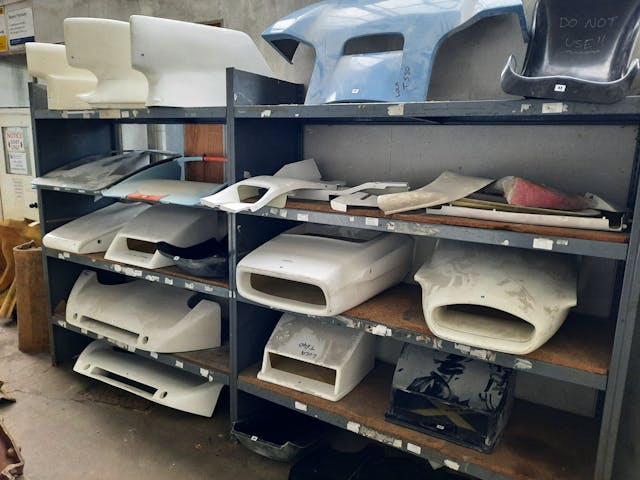
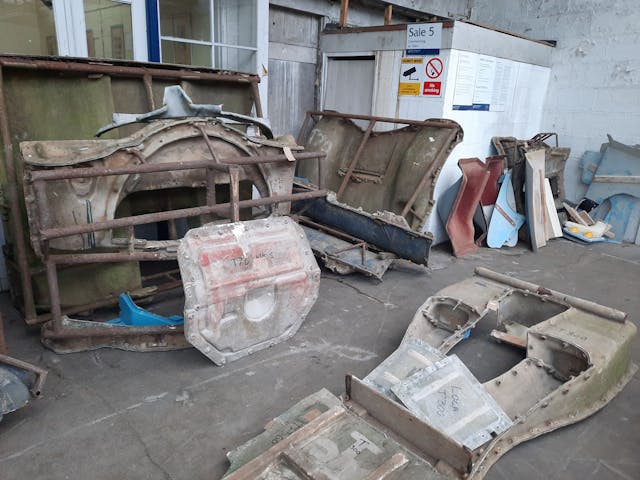
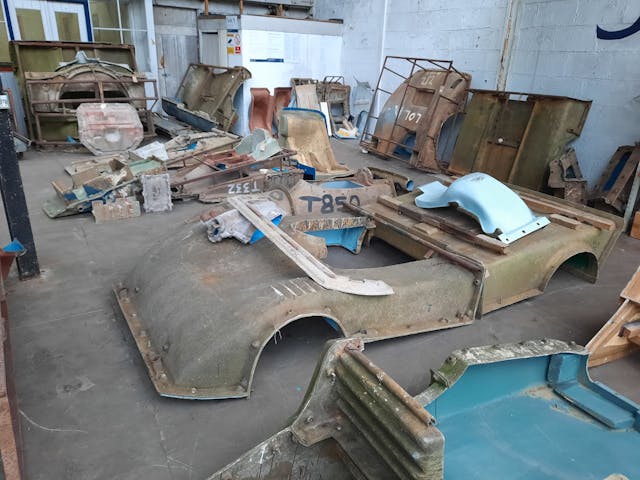
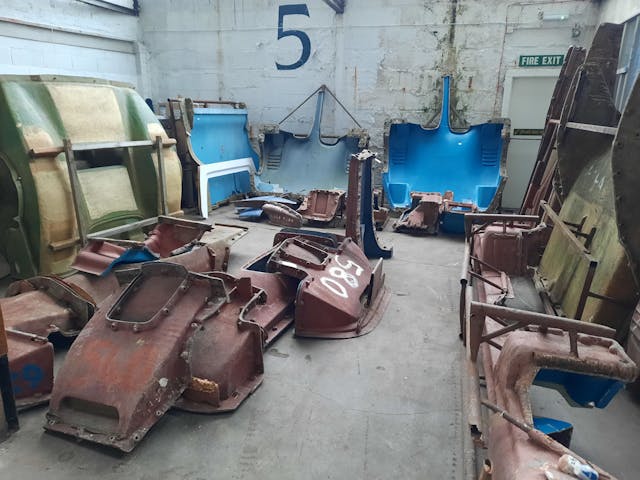
TWM has owned the molds since 1990, when it purchased them from Lola’s founder, Eric Broadley. Lola itself officially ceased trading in 2012, and the company’s assets and its name were snapped up by various other firms. A company called Broadley Automotive, meanwhile, currently builds authentic replicas of the original Lolas, including the T70, T76, and the Can-AM T160.
The collection of molds and tools will be sold through a timed online auction taking place on February 7. No estimates are listed, but each lot will be subject to both a 20.5 percent buyer’s fee, and a value-added tax (VAT).
***
Check out the Hagerty Media homepage so you don’t miss a single story, or better yet, bookmark it. To get our best stories delivered right to your inbox, subscribe to our newsletters.
The post Cache of Rare Lola Race Car Molds Hits Auction Block appeared first on Hagerty Media.
]]>
This story is being updated throughout the week.
Posts and analysis: From Thursday, our first full day of coverage, click here. For Friday, click here. For Saturday, click here. For Sunday, click here.
As the rest of the nation begins to thaw out from a bitter cold spell, Arizona’s big January auctions are heating up. About 2200 cars await their turn across stages belonging to five different auction houses, and the Hagerty Insider team is on the ground to track the results. Stay tuned—we’ll be providing regular updates below throughout the week.
2024 got off to an exciting start with a record $224M in sales Mecum’s Kissimmee event, headlined by several top-shelf sales. Kissimmee also offered some levity, with buyer and seller behavior suggesting a return to a more normal, rational market after a few years of frenzied activity.
We’ll be watching closely to see if the Arizona auctions build upon that trend. Manager of Valuation Analytics John Wiley’s forecast suggests that with fewer star cars and the anticipation of a reduced sell-through rate, Arizona’s sales are likely to be down from last year’s $262.8M.
With a bevy of restomods, blue chip cars, and even a few oddballs, the Arizona auctions have plenty to offer—check in regularly to see the latest sales and analysis.
Preview: Putting the January auctions into context
Welcome All! James Hewitt here, one of Hagerty’s market analysts. Let’s start this show off by putting context to what January means for the collector car market and how it has changed.
“The January auctions” historically refers to the market-gauging spectacle that is the Arizona collector car auctions. For good reason: Barrett-Jackson first held an auction there in 1971 and have hosted an annual event at the WestWorld arena since 1989. That auction has grown to a massive 2023 sales total of $183M (81% more than 2021) and an entertainment event like no other that includes four other auction companies in 2024. That’s a lot of money changing hands at one event and sure makes it’s easy to forget the “January auctions” are now far more than Arizona… In the last three weeks alone:
- The single-auction world record total sales number was already broken. Mecum broke their own 2023 world record total by selling $224M of vehicles at their Kissimmee auction
- Over $100M of cars have already sold at online auctions (2700+ cars)
- Mecum offered more than 4000 cars at their Kissimmee auction for the first time ever: 65% more than the whole of the 2023 Arizona auctions combined
One market pulse to check in January has now become three: Arizona, Kissimmee, and online.
What does the pulse say going into Arizona?
Our short term memory makes it easy to forget what normal is. Look long term: last two to three years of COVID boom were anything but normal. This is normal.
-
- Long term: Mecum’s average sell-through rate (STR) since 2010 for its Kissimmee auction is 68%. Excluding the 2021-2023 COVID boom, 70% is the best STR since tying 2016’s
- Short term: Kissimmee’s STR of 70% was a drop of 9 percentage points from 2023 (largest year-over-year drop in Kissimmee STR ever) and 16 percentage points from the 2022 Kissimmee high of 86%
Has the market hit a plateau and we can’t squeeze anymore out of it? Online auction total sales are plateauing despite more lots offered. Total sales at Mecum Kissimmee were a January single auction record, but just barely and it took more lots offered to do it. The most valuable cars are doing very well and demand is strong. The $2.5M+ segment at Kissimmee bounced back from 2023. 66% sold this year vs 29% last year:
-
- Ferrari Enzo bought for $4.1M in 2022 sold for $4.5M this go around
- Ferrari F40 hit a high bid of $2.55M at Amelia Island 2023 but sold with a high bid of $3.1M/final price of $3.41M at Kissimmee
Mecum’s Kissimmee auction celebrated its 25th anniversary this year. It’s hard to argue with the massive growth seen below but how much can the collector car market grow to keep up? Kissimmee added more lots but the number that met their reserve price fell. This led to almost flat total sales. At the same time, the Arizona auctions have been near a $250M ceiling since the 2016 high.
What are we watching as the week progresses?
We’ll be paying close attention to the sell-through rate (percentage of cars which meet their reserve price) and performance vs Hagerty Price Guide values of $1M+ cars—these performed very well at Mecum’s Kissimmee auction, and I predict 2024 will see $1M+ cars outperform other segments.
Changes in Hagerty Price Guide values of these cars are showing strong performance:
Modified vehicles—tastes are evolving, and modified vehicles are becoming more numerous—and more valuable—and Arizona is a strong destination for them.
Modifications used to be a way to turn less desirable vintage rides into something more marketable, but now it is common even for desirable vehicles like the ’63 Corvettes and ’67 Fastback Mustangs to get the restomod treatment. The market is responding by paying more for modified vehicles as their share of total sales grows faster than their share of vehicles consigned.
…
Sunday, January 28th
5:32 PM: A new twist on an old tradition: Barrett-Jackson ends Arizona Auction week with a Mercedes-Benz, although this one is an SSK replica. A $27,500 farewell.—Brian Rabold, VP Automotive Intelligence
12:35 PM: Barrett-Jackson is working its way through the final lots of the week. Meanwhile, preliminary results from RM Sotheby’s and Bonhams are as follows:
RM Sotheby’s
2024
Cumulative Total: $22.9M
62/84 lots sold: 74% sell-through rate
Average Sale Price: $369,962
2023
Cumulative Total: $44.0M
79/87 lots sold: 91% sell-through rate
Average Sale Price: $557,414
Bonhams
2024
Cumulative Total: $12.0M
68/85 lots sold: 80% sell-through rate
Average Sale Price: $176,522
2023
Cumulative Total: $30.0M
106/126 lots sold: 84% sell-through rate
Average Sale Price: $283,357
Shrinking totals and lower average prices from both events are significant, but more a reflection of a different mix of cars this year than a correcting market.—Brian Rabold, VP Automotive Intelligence
…
Saturday, January 27th
10:30 PM: Top 10 sales of Saturday
- 1956 Mercedes-Benz 300SL Gullwing sold for $ 3,410,000 (Barrett-Jackson)
- 2018 Bugatti Chiron sold for $ 2,970,000 (Barrett-Jackson)
- 1937 Mercedes-Benz 540K Special Roadster sold for $ 2,420,000 (Barrett-Jackson)
- 2005 Porsche Carrera GT sold for $ 1,870,000 (Barrett-Jackson)
- 2015 Porsche 918 Spyder sold for $ 1,787,500 (Barrett-Jackson)
- 2012 Lexus LFA sold for $ 1,650,000 (Barrett-Jackson)
- 2019 Ford GT sold for $ 1,375,000 (Barrett-Jackson)
- 2017 Ferrari F12tdf sold for $ 1,347,500 (Barrett-Jackson)
- (tie) 1997 Lamborghini Diablo VT sold for $ 1,100,000 (Barrett-Jackson)
- 1967 Chevrolet Corvette Base sold for $ 1,100,000 (Barrett-Jackson)
8:50 PM: Sometimes one vehicle can tell the story of the market, especially one with a very different view when looking short-term vs long-term. This 1967 Ford Mustang Eleanor Tribute Edition has sold four times (2019, 2022, 2023, and 2024) at auction. The sale price today came in at $143k; a 56% drop from its 2022 $330k sale price. Opening up that view shows the sale price was nearly exactly on its late 2019 sale price. What might appear like a plummeting market on some cars is really a return to normal levels seen before the COVID frenzy. — James Hewitt, Senior Data Analyst
8:24 PM: Another world record; this one maybe even more unexpected than the 300SL: A 1997 Lamborghini Diablo VT Roadster formerly owner by Donald Trump has sold for $1.1M. This sets a new world record at auction for the model. — James Hewitt, Senior Data Analyst
8:18 PM: Barrett’s 300SL sets a new world record price for a non-alloy Gullwing (coupe) at $3.41M. This chart puts into perspective how staggeringly high the sale is versus comparable Gullwing auction sales. The right car at the right time… — James Hewitt, Senior Data Analyst
7:03 PM: Time in the market trumps timing the market. Here are some stats on cars held for more and less than four years and the median percent change in the bid across appearances:
- 4+ years: bid to 8% higher than the previous appearance
- Less than four years: 0% difference
At least you still got to drive it in those four years, right? — James Hewitt, Senior Data Analyst
6:43 PM: When “wrapper car” and “barn find” collide. This one-of-547 1987 Buick GNX shows just 282 miles, still has the plastic on the seats, and was reportedly in a garage from 1988 until coming to Scottsdale. But one look at the car reveals dust, dirt, cracked bumper fillers and other signs of not-so-careful storage. Barrett-Jackson had ropes around it, possibly to keep people from wiping away that precious barn find dust, but a few people swiped it with their fingers anyway. In the end, the low odometer reading won out because it sold for $231,000, between its #1 (best-in-the-world) and #2 (excellent) value in the Hagerty Price Guide. —Andrew Newton, Senior Auction Editor
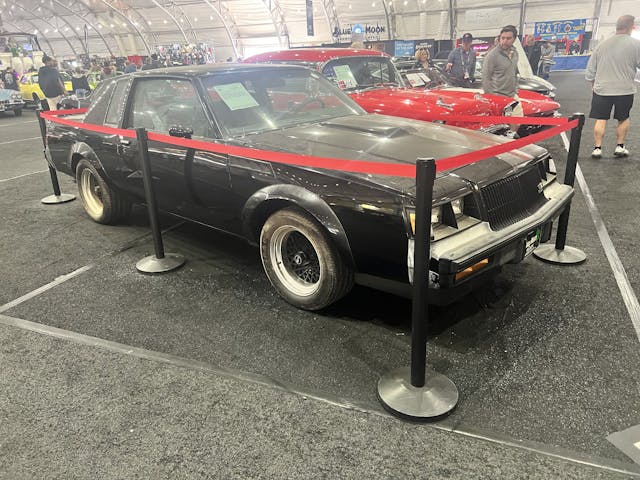
6:00 PM: This 1956 Mercedes-Benz 300SL was immaculate and desirably equipped and the bidders agreed, selling for a whopping $3.41 million including fees. This Gullwing brought a stunning 30% above our #1 condition value (accounting for options), showing that exceptional cars will always bring exceptional prices.—Greg Ingold, Hagerty Price Guide editor
5:57 PM: Back at the beginning of the week I suggested to research any lot to see if it had come to auction before (513 cars at the Arizona auctions have been to auction before—223 of those have been at auction within the last year), and I called out a 2014 Mercedes-Benz G63 AMG 6×6 Brabus as an example. After being auctioned six times from four different auction companies, it sold today for an all-in price of $880k. Previously it sold for $1.175M and $1.21M, and missed at a $1M high bid.—James Hewitt, Senior Data Analyst
5:30 PM: A $39K 1967 Lincoln Continental from Mecum’s Indy 2023 auction got the clean-up treatment to become a $143k Continental this week.—James Hewitt, Senior Data Analyst
4:53 PM: Barrett-Jackson sees strong results again with this 1937 Mercedes-Benz 540K Special Roadster out of the Don Williams collection, netting $2,420,000 all in.—Greg Ingold, Hagerty Price Guide editor
4:37 PM: There were two 2019 Porsche 911 Speedsters on offer in Scottsdale: one at Barrett-Jackson, the other at RM Sotheby’s. The RM car brought a respectable $456,000, came with 299 miles on the clock, wore a paint-to sample-color, and had an MSRP of $345,160. The Barrett car, however had triple the miles at 1,079 and a much lower MSRP of $295,030. The final price on that one? $550,000! That same car was bid to $333k in November 2022.—Greg Ingold, Hagerty Price Guide editor
3:29 PM: 24 years after the movie Gone in 60 Seconds was released, the Eleanor Mustang craze is still strong. While a departure from the original movie car, this replica still commanded a staggering $440,000. If that feels like a lot of money, it is, but at least it comes with a nifty couch made from a ’67 Mustang front end done up to look like the movie car!—Greg Ingold, Hagerty Price Guide editor
1:32 PM: Celebrity status often dictates a hefty premium above average market values, but not always. In this case, the $49,500 that Kris Jenner’s 1956 Thunderbird brought was marginally above a condition-appropriate value, proving that name recognition alone doesn’t equate to bundles of cash on the auction block.—Greg Ingold, Hagerty Price Guide editor
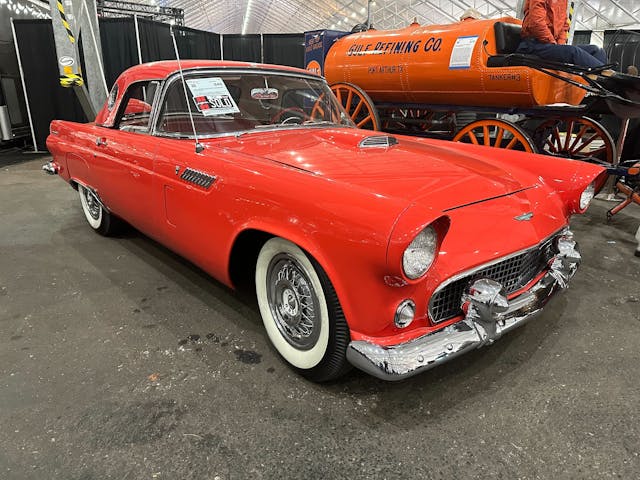
1:00 PM: Barrett-Jackson has been a key component in popularizing custom cars. Evidence of that popularity: 11 of this year’s 14 1963 Corvettes for sale at WestWorld, are customized.—Adam Wilcox, Senior Analyst
12:40 PM: We’re used to 1990s GM pickups being cheap. There are a ton of them out there still being used as work trucks and they’re not quite old enough to be “classics,” either. But they are old enough for people to feel nostalgic, and this 1994 Chevy Silverado 1500 is a 2166-mile cream puff in very ’90s Teal Metallic sold earlier this week for a shocking $57,200, well over twice its original 30-year-old sticker price.—Andrew Newton, Senior Auction Editor
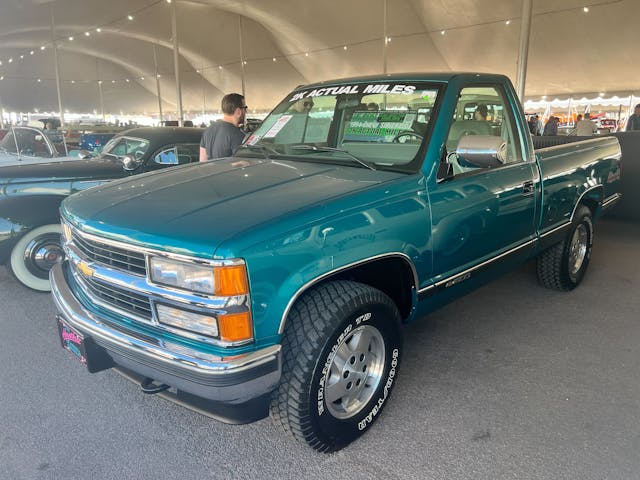
12:12 PM: The Lexus LFA Nurburgring that will sell today previously went unsold on BaT only a month ago with a $1.720m high bid. This was a year after it sold on BaT for $1.630m.—Adam Wilcox, Senior Analyst
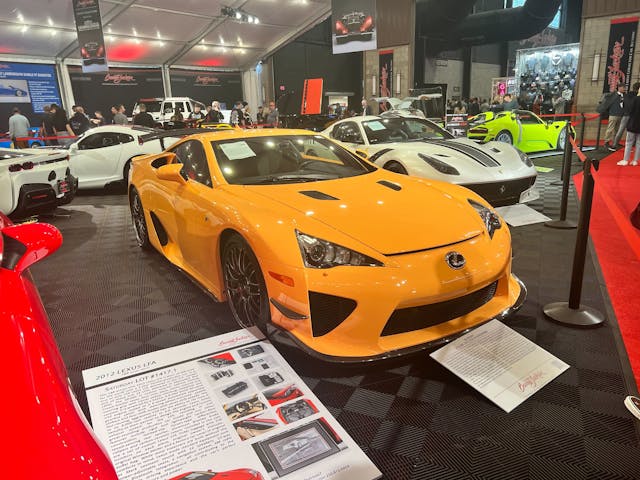
11:35 AM: Yet another example that cars usually make lousy investments. This 1990 Corvette ZR-1 was supposedly bought by its one and only owner “for collector purposes,” then was immediately trucked to a storage facility, only to emerge in late 2023 for service to get it road-worthy. It shows just 19 miles, and it sold here in Scottsdale for $35,200. But its window sticker reads $60,650 ($146K in today’s dollars). If you had put 60 grand in Apple stock 34 years ago, you’d have an 8-figure return today instead of barely $35,000.—Andrew Newton, Senior Auction Editor
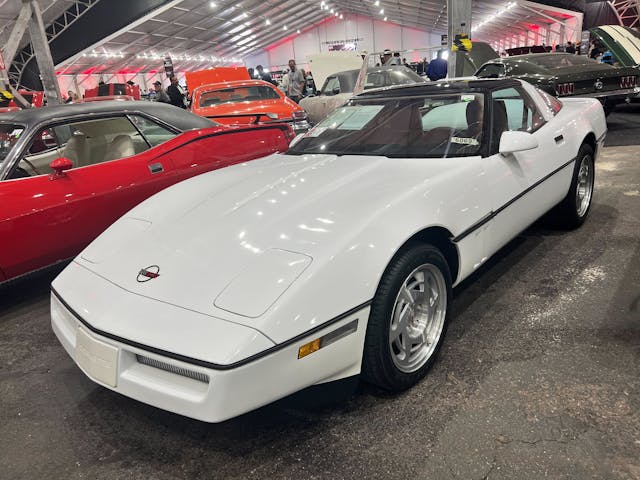
11:10 AM: Our old friend the, um, uniquely modified restomod E-Type from Mecum Monterey last year surfaced again in Scottsdale. Someone has since removed some of the appendages and cleaned it up a bit. It sold for $66K in Arizona vs. $50K in California, so it looks like the cleanup paid off.—Andrew Newton, Senior Auction Editor
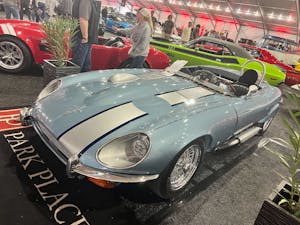
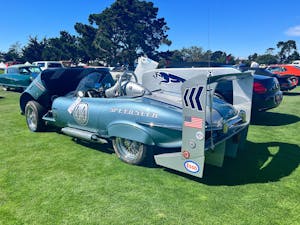
Friday, January 26th
Top 10 sales of Friday:
- 1961 Mercedes-Benz 300SL $1,215,000 (Worldwide Auctioneers)
- 1969 Ford Mustang Boss 429 $440,000 (Barrett-Jackson)
- 2009 Lamborghini Murcielago LP640 $346,000 (Worldwide Auctioneers)
- 1940 Packard Custom Super Eight Darrin $335,000 (Worldwide Auctioneers)
- 1967 Chevrolet C10 1/2 Ton $330,000 (Barrett-Jackson)
- 1970 Chevrolet Chevelle $280,500 (Barrett-Jackson)
- 1968 Dodge Charger $275,000 (Barrett-Jackson)
- 2008 Mercedes-Benz CLK63 AMG Black Series $247,500 (Barrett-Jackson)
- 1965 Superformance MKIII Cobra $242,000 (Barrett-Jackson)
- (Tie) 2023 Chevrolet Corvette Z06 $225,500 (Barrett-Jackson)
9:12 PM: On the flip side we have cars that sold for less than expected: Would you rather a 2001 Ferrari 360 for $71.5k (#4 Hagerty Price Guide value of $73k) or a 2004 Lamborghini Gallardo for $78k (Hagerty Price Guide #4 value $80k)?
Overall, exotics from the 2010s haven’t fared very well, On average this week they have sold for 7% below the Hagerty #3 value. The two outliers are a 2008 Ferrari F430 and 2010 Ferrari 599 GTB that sold for close to their #2 values. The poor performance of this decade coincides with a slump we are observing in late model cars not doing as well. At Mecum’s Kissimmee auction at the beginning of the month only 57% of cars three years old or newer sold. That’s compared to 81% at their 2022 auction during peak new car frenzy— James Hewitt, Senior Data Analyst
8:48 PM: That sold for HOW MUCH? Here is a sampling of five American cars that sold for double to triple the Hagerty Price Guide #1 value. It goes to show auctions are a roll of the dice and the right car at the right time can far exceed market expectations.
- 1970 Mercury Cyclone – $198k
- 1970 Chevrolet Camaro Z/28 – $176k
- 1964 Chevrolet Corvette 327/365hp convertible – $192k
- 1977 Pontiac Firebird Trans Am – $115.5k
- 2019 Chevrolet Corvette Z06 – $165k
— James Hewitt, Senior Data Analyst
8:40 PM: The “Minter” name is worth more than gold in the Thunderbird world. Barrett sold a 1957 Ford Thunderbird roadster for $220k. The Hagerty #1 value? $81.4k. Minter’s name nearly tripled it. — James Hewitt, Senior Data Analyst
8:14 PM: Big money for mid-century American style! A 1960 Cadillac Eldorado Biarritz convertible just sold for $193,600, right at our #1 condition value. However, we conditioned this vehicle at a #2-, which puts the sale price 42% above its condition appropriate value. — Adam Wilcox, Senior Data Analyst
6:32 PM: Our team of data crunchers often looks at the performance of vehicles versus their Hagerty Price Guide value to see what sells above, on, or below the market. Right now cars below $100k are faring much better than $100k+: 58% of them have sold above the condition appropriate Hagerty Price Guide value vs only 29% above (and 44% below) for $100k+. — James Hewitt, Senior Data Analyst
5:33 PM: If you think there are more vintage trucks crossing the block than you remember, you’re right. While the share of trucks and SUVs in Scottsdale is down slightly from their 22.9% peak in 2023, this year’s 21.9% is significantly higher than the pre-pandemic Arizona auctions. Just shows how popular vintage trucks have become. — Adam Wilcox, Senior Data Analyst
5:02 PM: You might have heard of a famous Oregon-based Porsche shop called Emory Motorsports that created the outlaw 356s. What you might not have known is their 356s sell for a staggering $750k on the open market. RM sold a 1957 Porsche 356 A Outlaw by Emory for $747,500 this week. That same car had been for sale at Porsche of Colorado Springs for $749,890 for several months. Maybe the buyer is in Arizona and wanted to save $2500 on shipping? — James Hewitt, Senior Data Analyst
3:33 PM: An Elkhart Lake Blue 2019 Corvette Z06 sold for $165,000 at Barrett-Jackson – nearly double its #1 value. That’s a pretty hefty sum for the final year a Corvette was built with a front-engine and manual-transmission. The fact that this same car sold for $65k less only a year ago, shows how quickly “the last” of something can become wildly collectable. — Adam Wilcox, Senior Data Analyst
3:25 PM: Six figure electric car! Not something you thought you’d hear this week, but that’s exactly what happened. Worldwide’s offering of a rare and unique 1918 Detroit Electric just netted a hefty sum of $112,000. Take that Tesla! — Greg Ingold, Hagerty Price Guide Editor
2:36 PM: A new, in-wrapper 1989 Chevrolet Blazer with only 21 actual miles just sold for $154,000 at Barret-Jackson, more than triple its #1 value. Proof the vintage SUV market is still red-hot for unique examples. — Adam Wilcox, Senior Data Analyst
2:28 PM: A pair of crusty, garage find Brits just crossed the block, a 1951 Jaguar XK120 Roadster and 1963 Morgan Plus Four selling for $30,800 and $16,800 respectively, showing that while the garage find phenomenon is still a thing, but not all bidders will abandon their senses to own one. — Greg Ingold, Hagerty Price Guide Editor
1:43 PM: Worldwide’s first seven-figure sale of the day comes curtesy of a striking black 1961 Mercedes-Benz 300SL roadster. After careful bidding, it brought $1,215,000 with buyers premium. — Greg Ingold, Hagerty Price Guide Editor

1:04 PM: It would be kind of corny if it was just done up to look like a police car, but this 1972 AMC Javelin SST actually did see use with the Alabama State Police in the ‘70s. It’s since been restored and sold here for $52,800, which is almost twice its #1 value. — Andrew Newton, Senior Auction Editor
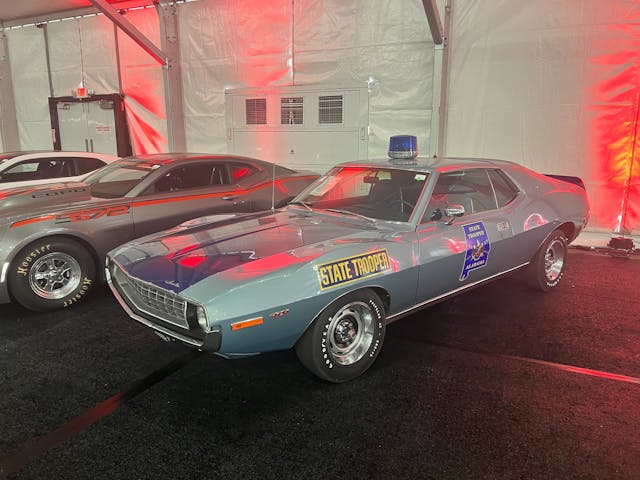
12:38 PM: Body number 1 Sunbeam Tiger crossed the Worldwide block to much fanfare, well known and documented and out of a 4 year restoration, the car brought a strong $134,400 including premium – besting our #1 value by 19%. — Greg Ingold, Hagerty Price Guide Editor
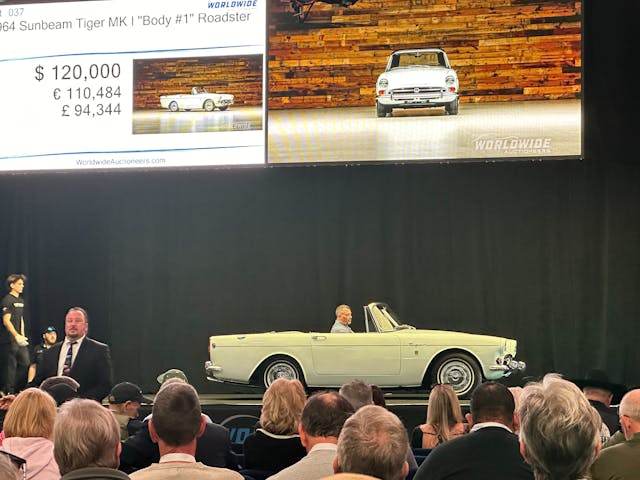
11:58 AM: Worldwide’s biggest sale so far jives with the theme of the week – newer cars selling well. A 4,300 mile, 2009 Lamborghini Murcielago LP640 Roadster sells for $346,000 including premium. Perhaps adding to the Lamborghini stereotype, the driver was vlogging from the block as bidding progressed. — Greg Ingold, Hagerty Price Guide Editor
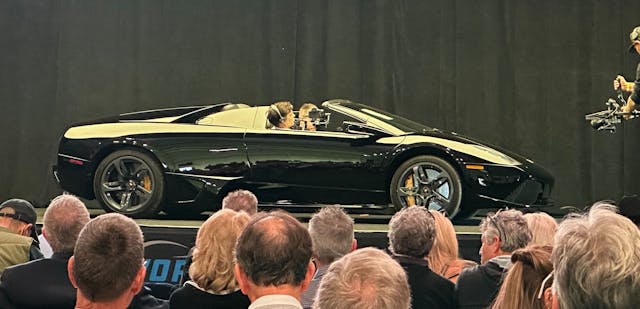
11:42 AM: Several high-dollar H1 Alphas selling this week, but $14,300 for a 17-mile, military-spec Hummer seems like a ton (more like 4 tons) of truck for the money, no? — Andrew Newton, Senior Auction Editor

11:33 AM: Officially Ford Motor Company’s 100-millionth vehicle, this is surely the world’s nicest, most significant, and at $37,400 most expensive ‘78 Ford Fairmont – an odd but real distinction. Sometimes a simple date, an event or a number can make up the majority of an otherwise unremarkable car’s value, and this is a prime example of that. — Andrew Newton, Senior Auction Editor
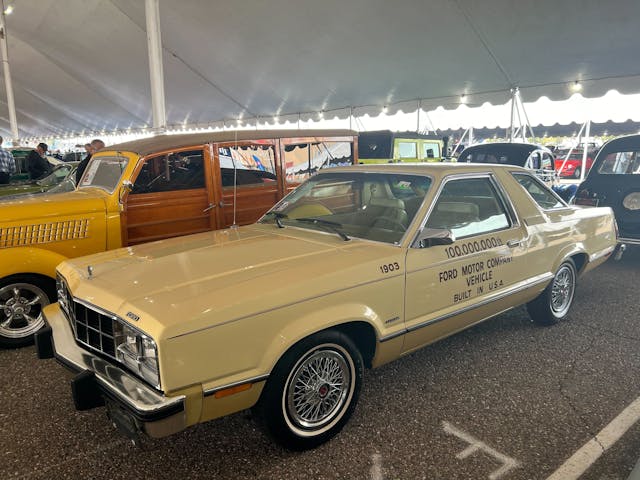
11:02 AM: Worldwide’s one day sale has begun at Singh Meadows in Tempe. Over the next few hours, around 100 cars will cross the block ranging from prewar classics to modern exotics, we’re in the room watching it all. — Greg Ingold, Hagerty Price Guide Editor
9:05 AM: On the schedule for today, 98 cars will cross the block at Worldwide’s one-day auction. Barrett-Jackson will continue with the fifth day of their seven-day auction. MAG will continue with their second day of their three-day auction. — Adam Wilcox, Senior Data Analyst
…
Thursday, January 25th
10:20 PM: Overall Top 10 Sales from all auctions through Thursday:
- 2022 Bugatti Chiron Super Sport Coupe sold for $5,175,000 (Bonhams)
- 2020 McLaren Speedtail Coupe sold for $2,012,500 (RM Sotheby’s)
- 1938 Mercedes-Benz 540K Sindelfingen Special Roadster sold for $1,545,000 (RM Sotheby’s)
- 1936 Bugatti Type 57 Atalante Coupe sold for $1,380,000 (Bonhams)
- 1963 Ferrari 250 GT Lusso Coupe sold for $1,352,500 (RM Sotheby’s)
- 1963 Shelby Cobra 289 W&S Roadster sold for $1,215,000 (RM Sotheby’s)
- 2021 Ford GT Mk II sold for $1,006,000 (RM Sotheby’s)
- 1965 Aston Martin DB5 Coupe sold for $797,000 (RM Sotheby’s)
- 1957 Porsche 356A Outlaw Coupe sold for $747,500 (RM Sotheby’s)
- 1984 Audi Quattro Sport Coupe sold for $665,000 (RM Sotheby’s)
10:01 PM: Is it a buyer’s market or seller’s market? Considering the median difference in price between today and the last time it was at auction of a vehicle last seen at auction in the last four years is 0% it might be safe to say it is a healthy market for all involved. — James Hewitt, Senior Data Analyst
7:03 PM: Buy low sell high (or the unfortunate oppposite…). It’s no secret I love repeat sales – let’s look at some of the best and worst so far.
Best:
- 1961 Cadillac Series 62: From $33k in June 2023 to $81.4K today
- 1941 Lincoln PLM Custom Limousine: From $33k two months ago to $72k today
Worst:
- 1986 Ford Bronco: From $60k in 2021 to $46k in 2023 to $27k today. This Bronco isn’t garnering the bids it once was.
- 1966 Wolseley Hornet Mk II: Bought at the start of the COVID collector car frenzy for $26k and sold today for $8k.
— James Hewitt, Senior Data Analyst
6:59 PM: The right venue makes all the difference. Barrett’s heavily modified 1957 Chevrolet Custom Cameo pickup sold for $104,500 this week. That same truck was bid to only $37K in early 2020 on Bring a Trailer. After all, Barrett-Jackson’s Arizona auction is known for being the Mecca of modified cars. — James Hewitt, Senior Data Analyst
6:50 PM: The Audi Sport Quattro is a rare sight at auctions, with only 214 produced. But, this one at RM just sold for $665,000 setting a record for the model and besting our #1 condition value by nearly $100k. — Adam Wilcox
5:49 PM: $324,000 for the 2014 Ferrari FF at RM is nearly double it’s current #1 condition value. This bodes well for this years Hagerty Bull Market List. The most important part of that sale – it was a 90 mile car. It shows the FF has collector value or some buyers feel it provides something newer models can’t. — Adam Wilcox and James Hewitt.
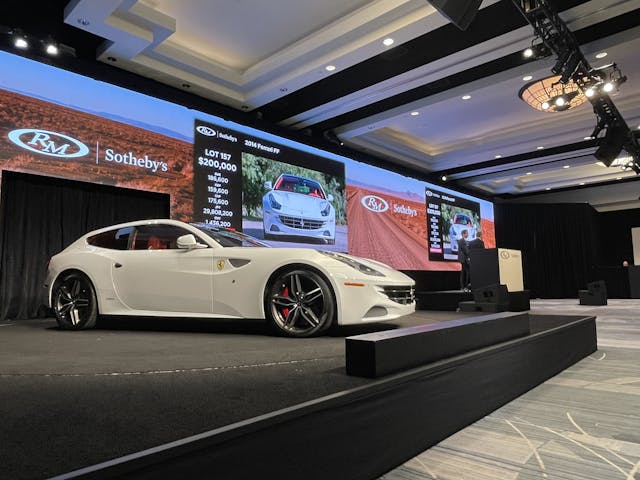
5:34 PM: Someone got a whole heck of a lot of car in RM’s $215,000 Lynx-built 1970 Jaguar XK-SS recreation. Great way to drive a legend for both a fraction of the price and a fraction of the worry. — C.G., Hagerty Contributor
5:32 PM: RM was able to scrape past the $1M mark to get $1.006M for a 2021 Ford GT MKII: a car with a $1.2M base MSRP. That’s a far cry from the $2M sale prices achieved by the first 2nd-generation Ford GTs coming to market when the MSRP was closer to $450K. A first-generation 2006 Heritage Edition achieved $550k. Base MSRP back then? $140K.
— James Hewitt, Senior Data Analyst
4:57 PM: $456,000 for a 991.2 Speedster goes for $200,000 more than RM’s earlier $257,600 991.2 GT3 RS. Both are right inline with the Price Guide, but quite a spread between a technically “better” performance sports car and its limited, heritage-inspired sibling.— C.G., Hagerty Contributor
4:31 PM: RM’s 1938 Mercedes-Benz 540 K Special Roadster sells at no reserve for $1.545M all in today. That same car sold nine years earlier for $1.87M. — James Hewitt, Senior Data Analyst
4:05 PM: Lots 128 and 130 at RM almost gave us the opportunity to gage the Dino vs Daytona market. In recent years, the value of “Chairs and Flares” optioned Ferrari Dinos surpassed the Ferrari Daytona, where the Dino’s chairs borrowed their style. However, the 1973 Dino 246 GTS didn’t make reserve with a $550k high bid, so the $570,000 hammer on the no-reserve 1972 Ferrari 365 GTB/4 Daytona won this round. — Adam Wilcox, Senior Data Analyst
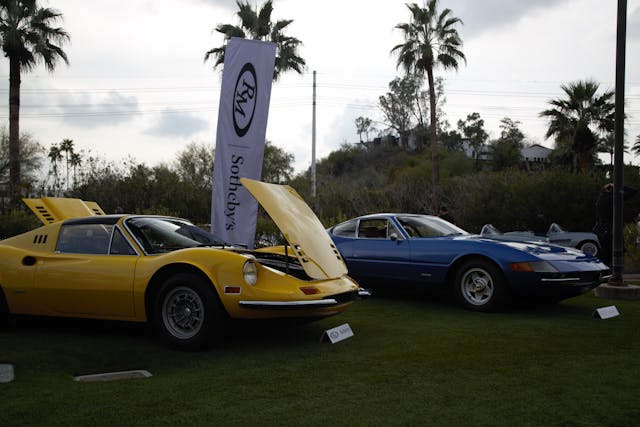
3:02 PM: At RM, A very gorgeous and very yellow 1969 Corvette Convertible with the exceptionally rare L89-Code 427 saw lively bidding, selling for $313,000 and blowing past #1 condition value. These cars rarely come up for sale and bidding here shows that the best and rarest cars still bring exceptional prices. — Greg Ingold, Hagerty Price Guide Editor
2:34 PM: It’s not just muscle and restomods bringing money at Barrett-Jackson. This all-stock, low-mile but used 1989 Toyota MR2 is in #2- condition but sold for $51,700, about 6 grand over its #1 value. — Andrew Newton, Senior Auction Editor
2:34 PM: Lot 108 at RM, a 1975 Porsche 911 Carrera which sold with a final bid $80k short of its low estimate, may have looked like a disappointing sale, but its sale price of $134,400 is 12% above its #1 condition value when options are accounted for. Not bad for a car we gave a #2- condition. — James Hewitt, Senior Data Analyst
2:29 PM: Over at Barrett-Jackson, a 1970 Chevrolet Camaro Z/28 with 11,788 actual miles just sold for $176,000, double its #1 condition value. — Adam Wilcox, Senior Data Analyst
2:02 PM: RM’s 85-lot auction is underway, starting with their first lot, a 1939 American Bantam Roadster, hammering 25% above its high estimate of $35,000. — Adam Wilcox, Senior Data Analyst
1:37 PM: After the Cadillac V16 no sale, Bonhams’ other two pre-war heavy weights went with mixed results. While neither were bid past their low estimates, only one went on to new owners. The 1931 Duesenberg Model J Convertible, which was shown at the 1931 Paris Salon and originally sold to Queen Maria of Yugoslavia, failed to sell with a high bid of $1,880,000. However, the 1936 Bugatti Type 57 Atalante Sunroof Coupe (pictured below) sold for $1,380,000. — Adam Wilcox, Senior Data Analyst
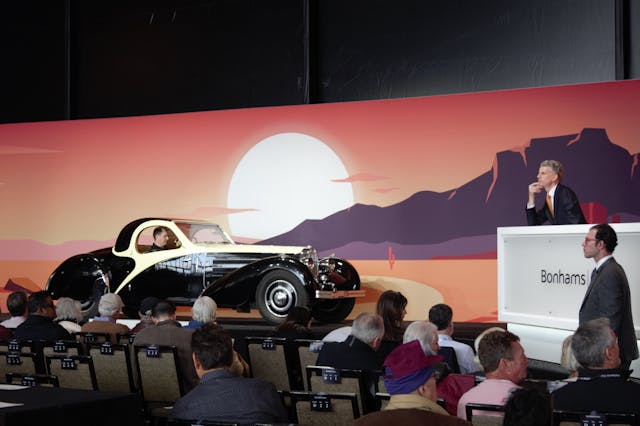
12:52 PM: On the other end of the spectrum… Fun, rarity and cute factor per dollar are all way high on this 1969 Moretti 500, which sold for just over $10K at Bonhams. One of just 50 built, it’s a little scruffy but very charming. — Andrew Newton, Senior Auction Editor
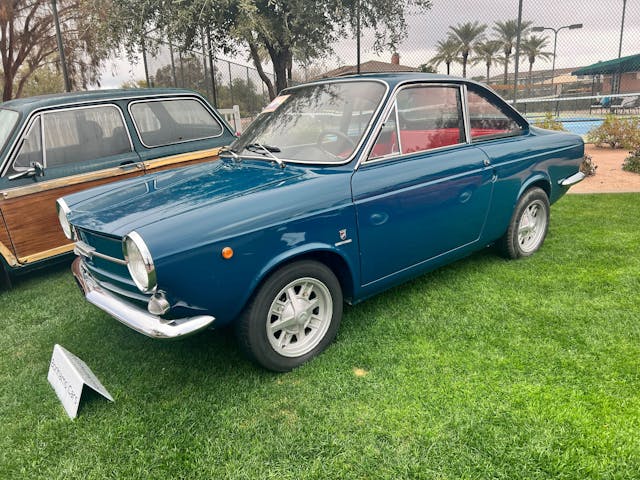
12:47 PM: Bonhams’ 2022 Bugatti Chiron Super Sport 300+ hammered “sold!” at a whopping $4.7 million high bid. The offering represents one of the biggest potential sales of the week, but with a reported eight brought into the country at this specification, where will you find another? — Greg Ingold, Hagerty Price Guide Editor
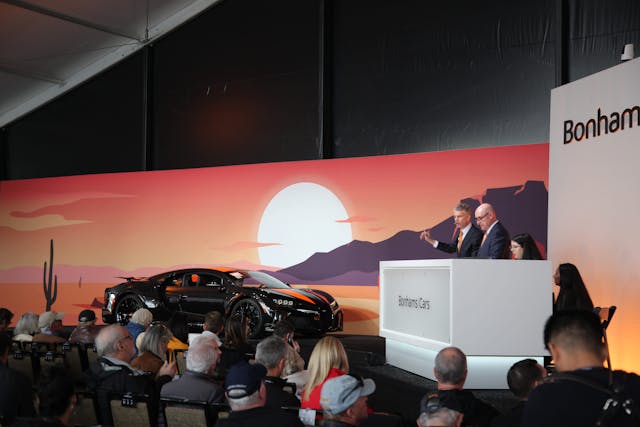
12:28 PM: Sometimes the parking lot can rival the cars in the tent. A small sample from outside Bonhams. — Brian Rabold, V.P. of Automotive Intelligence
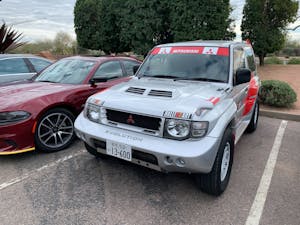
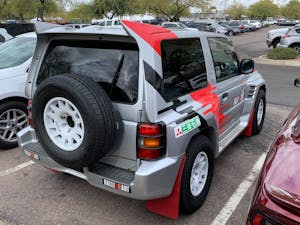

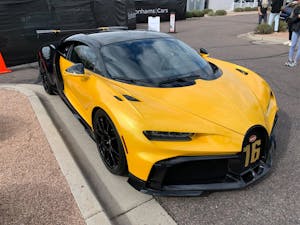
12:12 PM: Bonhams offering of a 1964 Ford Galaxie Convertible with 99 original miles showed up in a big way. Spending several minutes on the block, this time capsule was bid up in steady increments to over double #1 condition, this goes to show that the right car in the right place will bring out the bidders. — Greg Ingold, Hagerty Price Guide Editor
12:00 PM: Spitting rain has turned the Bonhams show field into a marsh. It’s fun to watch hulking, chrome-covered Deuseys cut ridges through the muck. For some cars here, this is the first time they’ve seen rain in decades. — C.G., Hagerty Contributor
11:45 AM: At Bonhams, the 1930 Cadillac 452 V-16 Roadster failed to sell after a bidding slowdown at roughly $140,000 under low-estimate. That’s a shame, as for Pre-War American metal, it doesn’t get much more blue-chip than this. And, as a perfect contrast, the 1951 Kaiser Deluxe that immediately followed saw quick bidding that pushed the winning bid to the $35,000 high estimate. — C.G., Hagerty Contributor
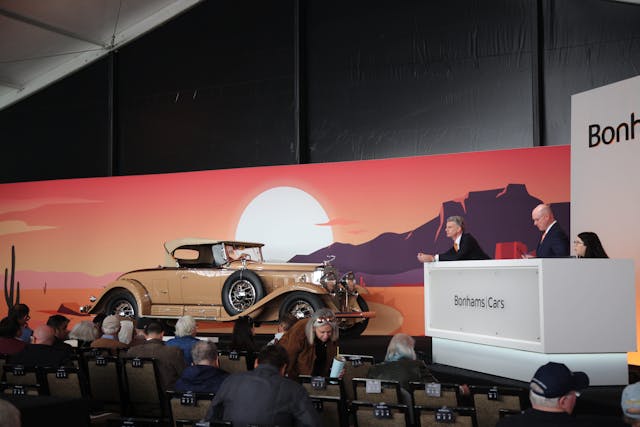
11:00 AM: The first 15 lots at Bonhams were offered with no reserve and sold with varying degrees of success. A 1966 Aston Martin DB6 Saloon sold for $268,800 (29% over its appropriate Hagerty Price Guide condition (#4+) value). The best buy of the group was the 1959 Citroen ID 19 Berline which sold for $19,040 after fees, half its low estimate. — Adam Wilcox, Senior Data Analyst
10:17 AM: Bonhams is about to begin. There is a great lineup of cars with some big pre-war headliners such as a 1936 Bugatti Type 57 Atalante, 1930 Cadillac V16 Roadster, and 1931 Duesenberg Model J, however the biggest anticipated sale is for a 2022 Bugatti Chiron Super Sport with a $5.5M high estimate. — Greg Ingold, Hagerty Price Guide Editor
9:00 AM: On the schedule for today, Bonhams and RM Sotheby’s will both hold their single-day auctions, and Barrett-Jackson will continue the fourth day of its week-long auction. — Adam Wilcox, Senior Data Analyst
8:15 AM: Checking into my hotel in the heart of Phoenix, and again, a quick conversation with the check-in desk proved Barrett-Jackson is the name-brand of the week, as that’s all you’ll hear from locals. — C.G., Hagerty Contributor
Wednesday, January 24th
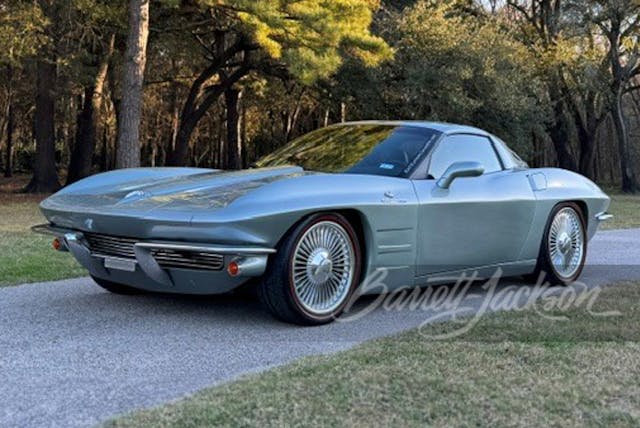
10:15 PM: The most expensive vehicle to sell so far is a unique 2009 Chevrolet Corvette that was customized to look like a ’63 split-window Corvette. At $128.7k it also costs as much as a split-window Corvette…
10:00 PM: If you’re looking for a bidding thrill on a budget make sure you get in and out early. The average price of the a vehicle creeps up substantially as the week goes on. This is after only three days at Barrett-Jackson’s auction:
7:57 PM: Top tip: as you’re prepping to bid on cars make sure to research if they have come to auction before. Many have: 513 cars at the Arizona auctions have been to auction before – 223 of those have been at auction within the last year. Take this 2014 Mercedes-Benz G63 AMG 6×6 Brabus for example: in the last two years we have seen this exact vehicle auctioned six times at four different auction companies. The high bid has ranged by a staggering $450k, from a high of $1.35M in late 2021 to a low of $900k in March 2022, and the two times it managed to sell had an all-in price of $1.175M and $1.21M. At Broad Arrow’s August 2023 Monterey auction it reached a $1M high bid and failed to sell. Any guesses on what it will get bid to (or sell for) this week? — James Hewitt, Senior Data Analyst
12:05 PM: We’ve landed in Scottsdale and are surveying some of the lots that will be heading across the block tomorrow. This 1948 Citroen 2CV at Bonhams is a rare model from the first year of production. It’s a little rough around the edges but charming. Features unique to early 2CVs include: a corrugated hood, early-style grille, and a full-length folding roof. The 9-horsepower 2-cylinder was good for a 0–25mph time of 42.4 seconds. 60mph was out of the question. — Andrew Newton, Senior Auction Editor
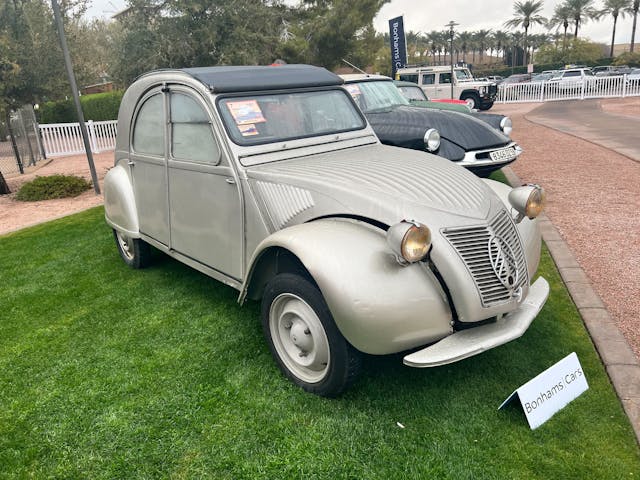
The post We’re Live at the Arizona Auctions appeared first on Hagerty Media.
]]>
A huge collection of work trucks, tractors, and cars from the 1910s through the 1990s is set to be sold on October 26 and 27 by Kraupie’s Real Estate and Auctioneers. The auction, which we learned about thanks to Barnfinds.com, will be held at Scrapco, in Sidney, Nebraska, just north of Interstate 80 in the southern Nebraska panhandle. The bulk of the collection seems to be light- and medium-duty trucks from the ’30s,’40s, ’50s, ’60s, and ’70s, with mid-century tractors from Massey-Harris, Ford, International Farmall, and John Deere to match. Even if trucks aren’t your thing, with more than 800 vehicles set for sale, there’s something to suit your tastes.
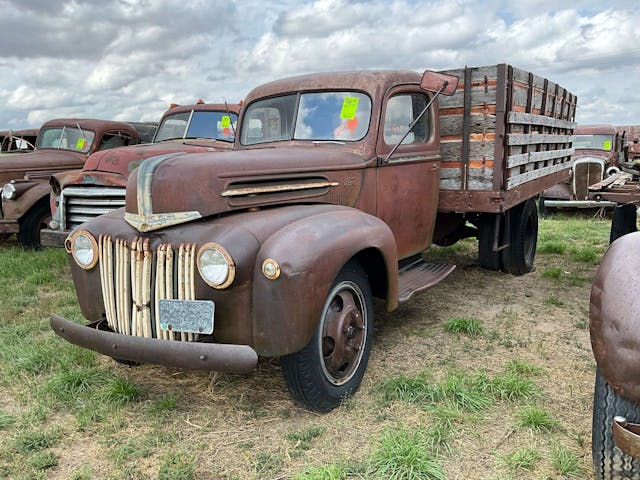
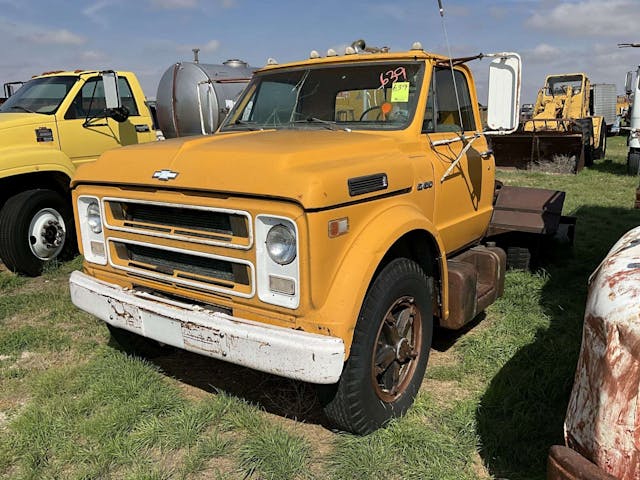
The 1946 Ford and 1967 Chevy shown above are a good representation of the bulk of the vehicles up for grabs, and while there might not be a lot of collectors that need a big flatbed, we hope that some of these workhorses can return to at least some kind of use, even if they’re kept with all of their patina. Among the hundreds of flatbed trucks, we spotted some rather unique and noteworthy models that are worthy of restoration.

One of the coolest cars that we found is the 1969 Cadillac wagon that you no doubt spotted above. Cadillac didn’t make wagons like this in the ’60s; they were built by upfitters. We’ve seen a couple of different variations of the roof and tailgate on these models; this combination seems to be lifted from a 1969 GM B-body and seamlessly grafted onto the Cadillac sedan. The pillarless four-door already had great lines, and the long roof only accentuates them. We’re already visualizing this thing restomodded with a 4L80 overdrive behind the big Cadillac V-8 and maybe some bull horns up front. You know, to keep it classy.
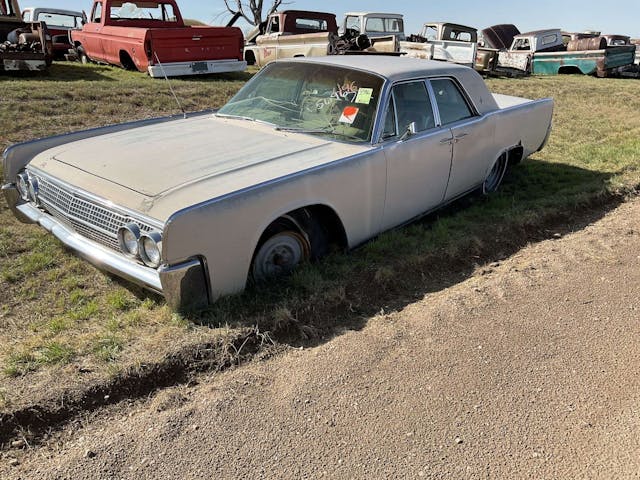
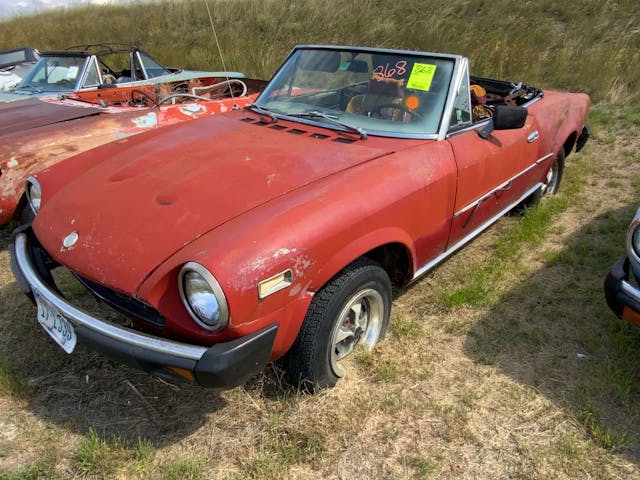
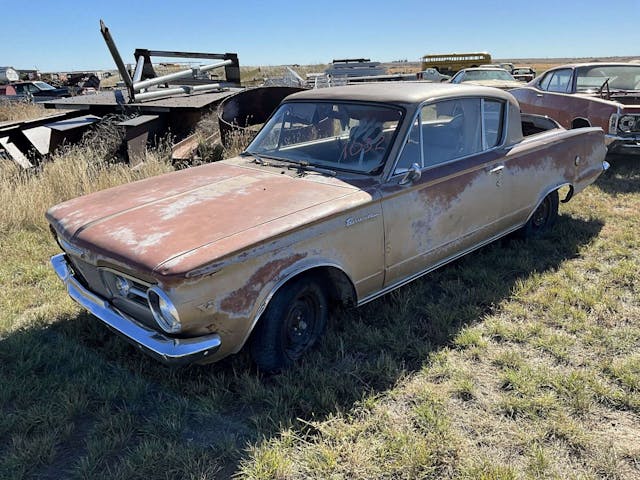
Besides our rare Cadillac, we found a rusty but seemingly complete Lincoln Continental, a six-pack of Fiat Spiders, and a fastback 1964 Barracuda missing its rear glass that got our imaginations going. Some collectors have taken notice of the Barracuda, but plenty of restorable classics have nary a bid.
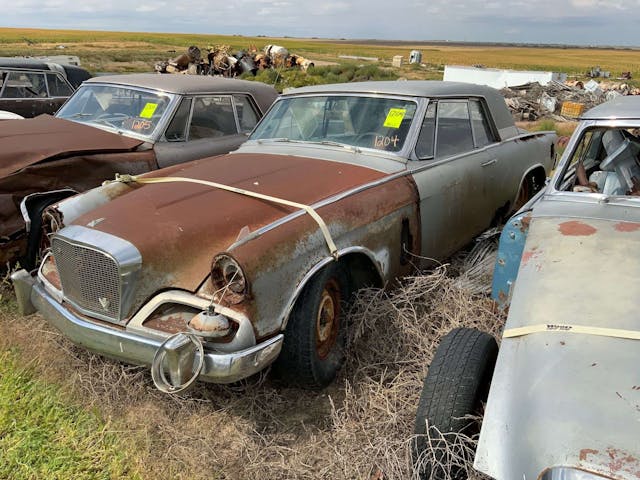
While the collection seems to have a little bit of almost everything, there are a few other models that stand out. One that is definitely overrepresented is Studebaker’s Grand Turismo Hawk, with seven listed for sale. The unique roofline of this particular variant is stunning and is one of our favorite Brooks Stevens designs, which is saying something. In just that one photo, you can see four of them lined up together.
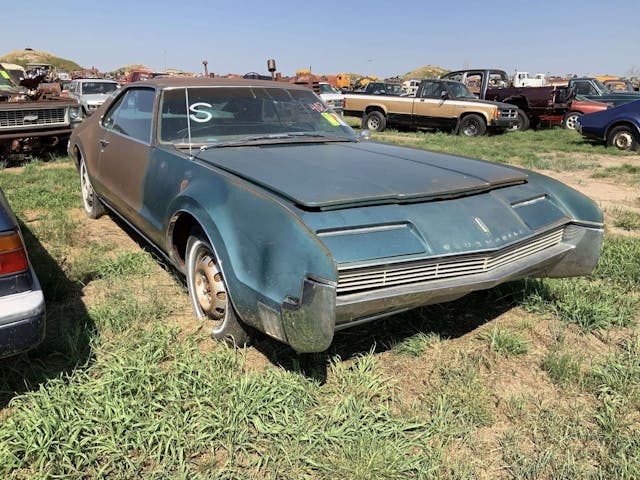
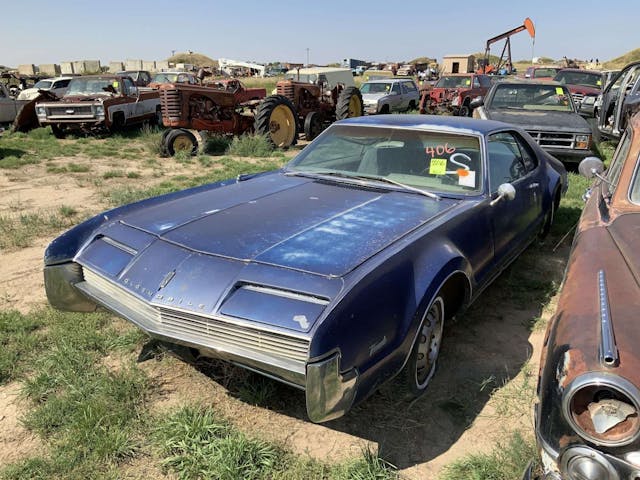
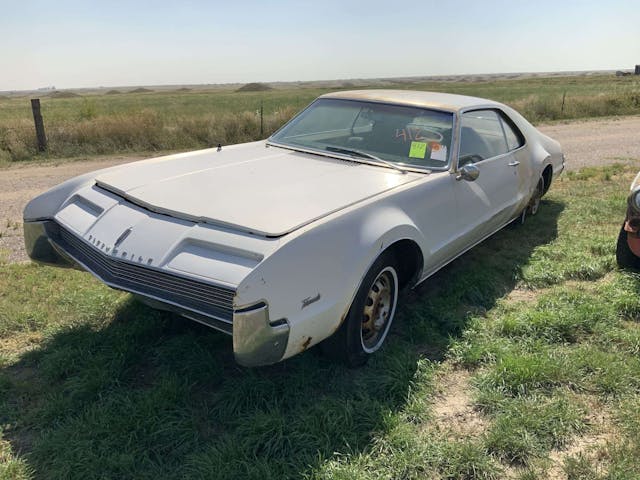
We also spotted three Olds Toronados, which has got to be the highest concentration of those uniquely beautiful personal luxury coupes we’ve seen in a long time.
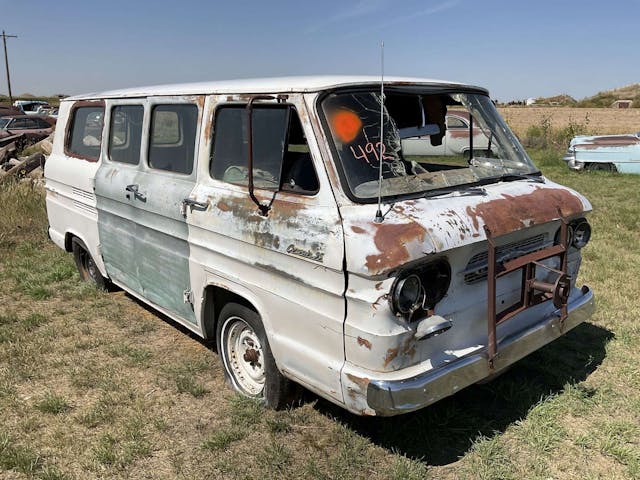
Dig through the listings and you’ll find mid-century sedans and wagons from the Big Three as well as several Corvairs, including a few sedans, a couple of coupes, and a pair of vans.
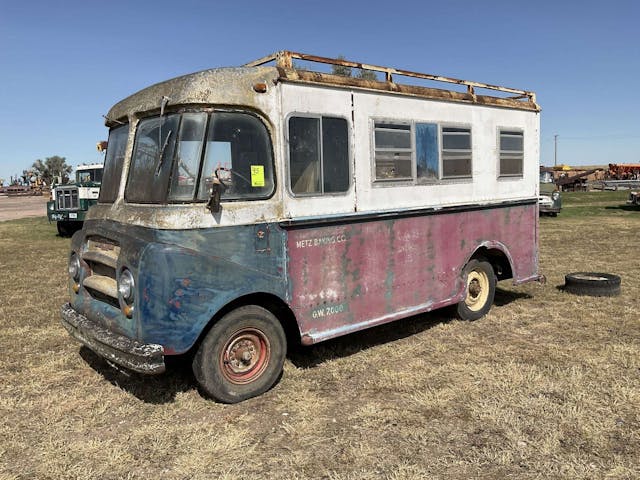
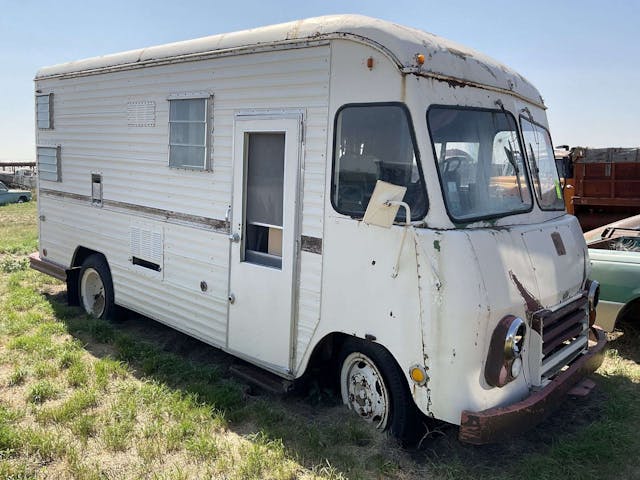
If long-distance road trips are your calling, the auction has a couple of vintage RVs and some big sport utility vehicles that would make for excellent projects. Think of the boxy Chevy and Ford shown above as the grandfathers of the conversion van or mini RV. These short-wheelbase vans would require some innovative packaging inside to make for a comfortable mini RV, but we’d love to see some resourceful craftsperson give it a shot.
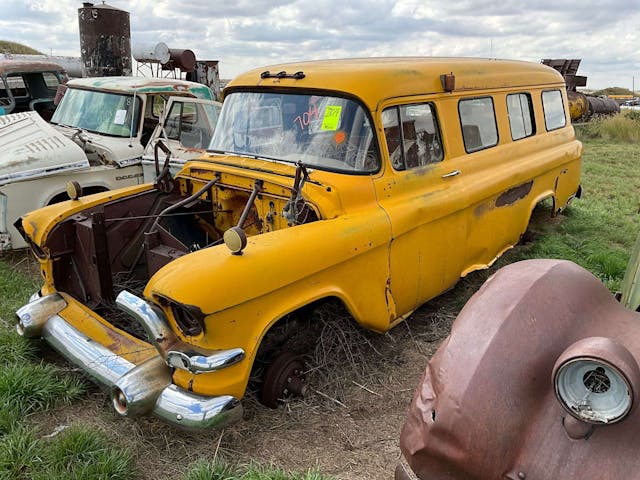
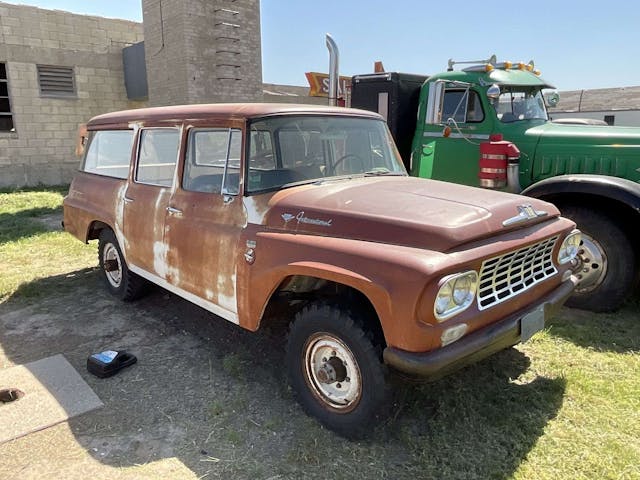
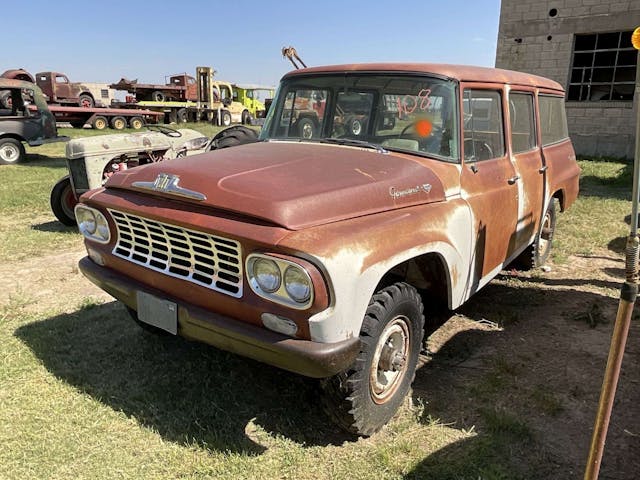
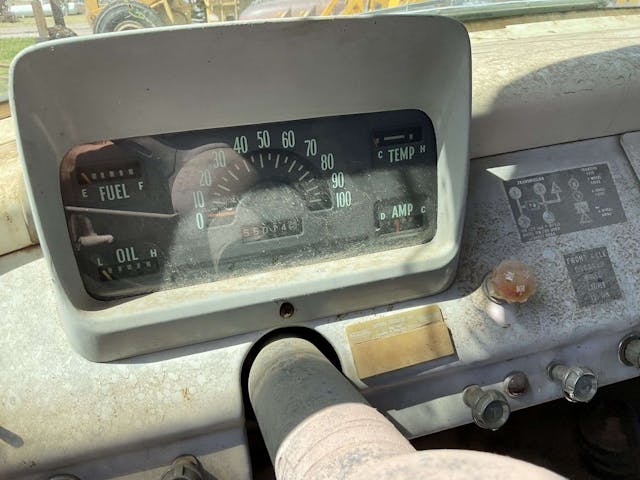
This GMC bus and International Harvester Travelall would both make excellent overlanders given the proper underpinnings. The Travelall has the same wheelbase as the second- and third-generation Ford Expedition, if you’re up for a chassis swap that doesn’t involve any shortening or stretching. Ford used Navistar diesel engines for a while, so you could justify the swap for all but the most hardcore of IH fans.
There’s not much time to make plans to see this auction if it wasn’t already on your radar, but if any of our readers do wind up with one of these classics we talked about, or any of the hundreds of others, please let us know about your plans and any progress. We’d love to see some of these projects make it back on the road.
***
Check out the Hagerty Media homepage so you don’t miss a single story, or better yet, bookmark it. To get our best stories delivered right to your inbox, subscribe to our newsletters.
The post 800+ trucks, tractors, and mid-century cars up for auction in NE appeared first on Hagerty Media.
]]>
Texas kitchen entrepreneur Gene Ponder is selling off his 120-strong collection of European sports cars.
Over the course of 15 years Ponder gathered an incredible number of rare original classics and recreations, but has now decided to get rid of them all in one amazing garage sale. Hosted by RM Sotheby’s at Ponder’s purpose-built facility in Marshal, Texas, the sale includes a deep-red 1967 Ferrari 330 GTC (Hagerty #1 Concours estimated value $675,000), and a 1960 Mercedes-Benz 300SL Roadster (Hagerty #1 Concours estimated value $1.75 million). Also offered is one of only 14 1935 MG PB Airline Coupes, and an exact replica of a 1936 Bugatti Atlantic, built with authentic parts in Switzerland.
Interestingly this is not the first time Ponder has had a major sale. After suffering a heart attack in 2007 he sold 60 cars with RM Sotheby’s for around $15 million, but started collecting again after he recovered.
This time it’s an everything must go deal, with more than 120 cars, motorcycles and memorabilia items up for grabs. The sale will be hosted by RM Sotheby’s from September 22-24.
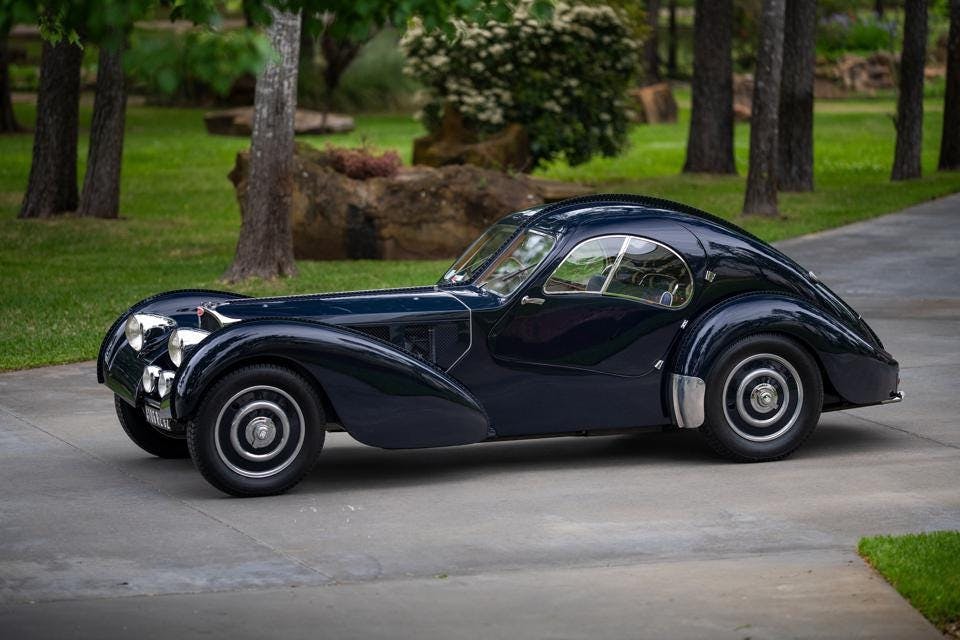
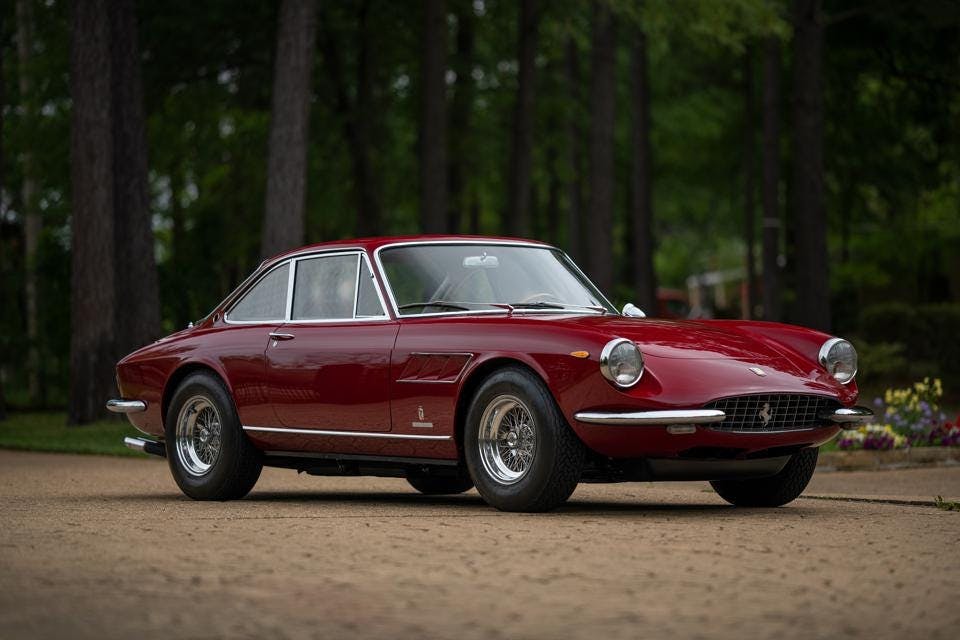
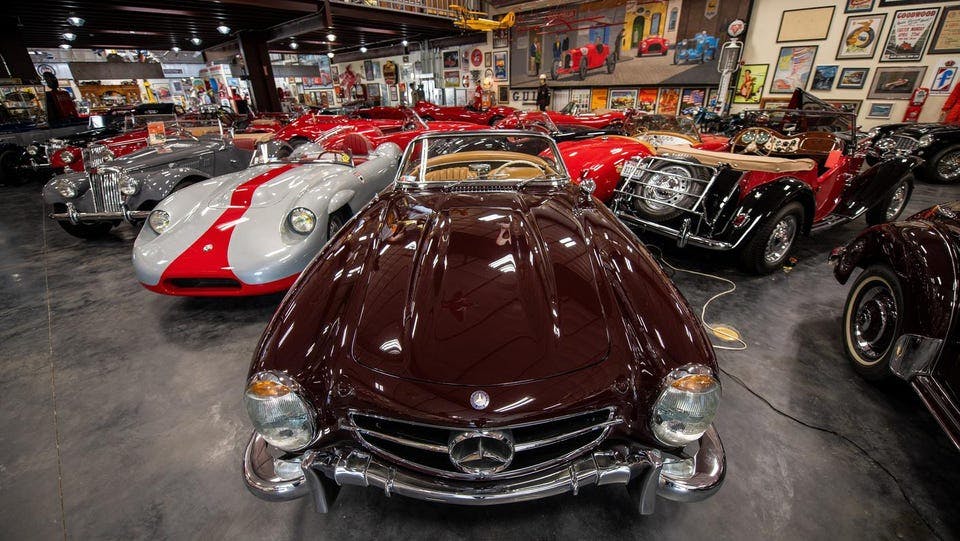
The post $20 million Texan collection to go under the hammer appeared first on Hagerty Media.
]]>
The last Buick Grand National ever built heads to auction
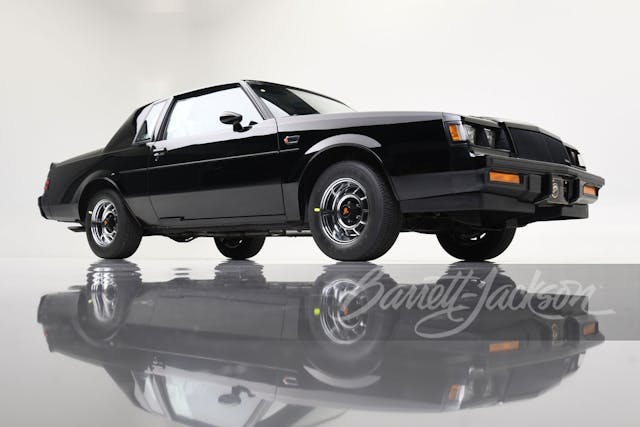
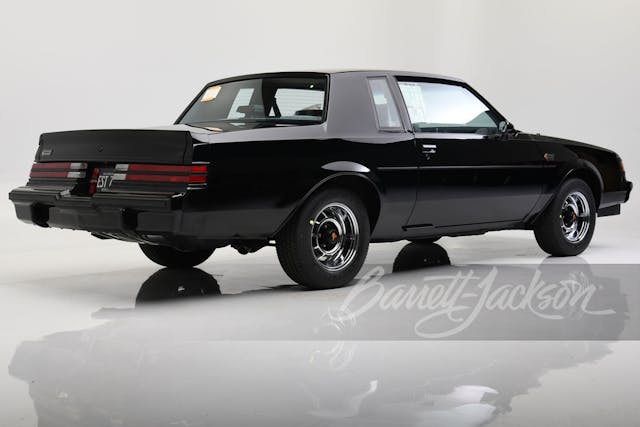
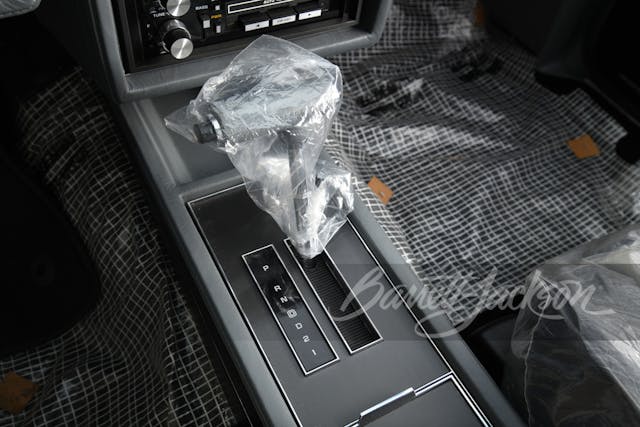
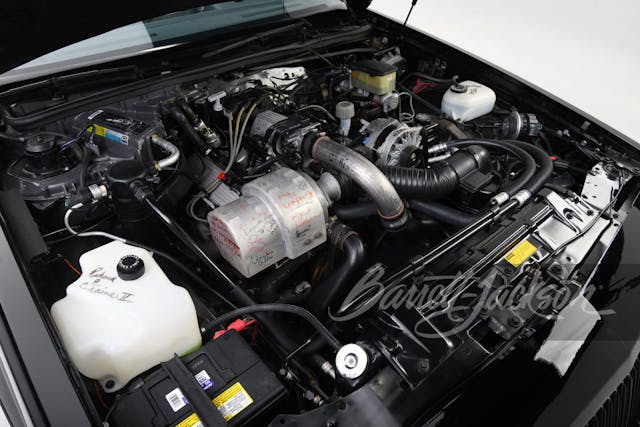
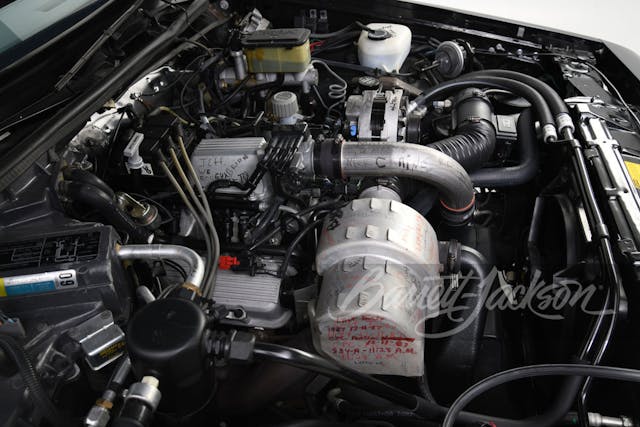
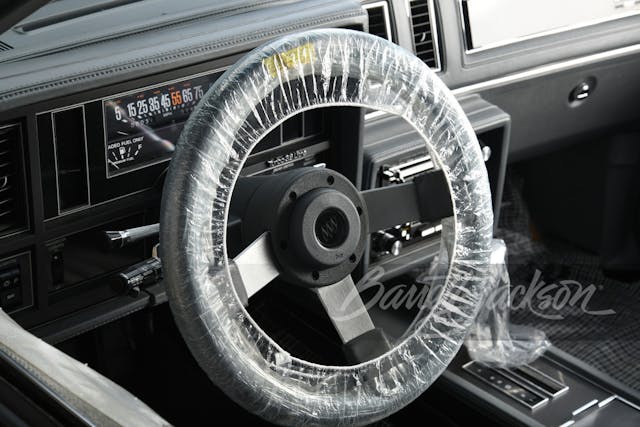
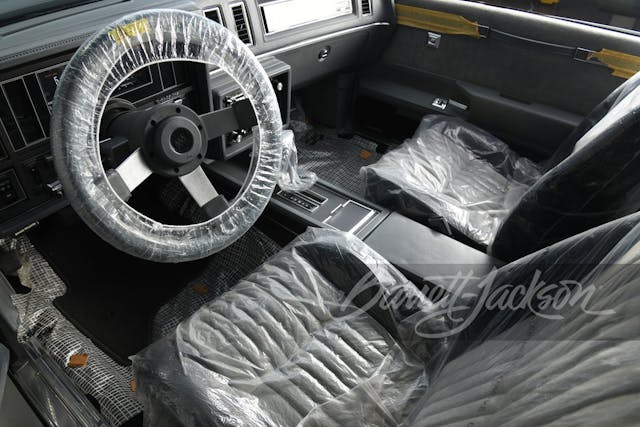
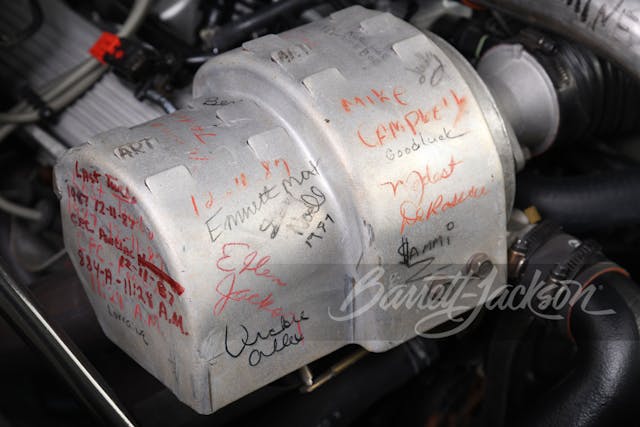
Intake: As far as last-ofs go, this one’s a doozy for ’80s GM buffs. The last Buick Grand National ever built will head to auction next month at Barrett-Jackson’s Scottsdale sale. It was the final car to roll off the General Motors Pontiac, Michigan, assembly plant as well, and it marked end of GM’s mid-size rear-drive G-body platform. The black beauty shows just 33 miles on the clock and still wears the factory-installed interior plastic. Documentation is extensive and thorough, with the original window sticker that says “The Last Grand National” on it as well as a host of photo and video materials collected by a GM film crew. The car will cross the block with no reserve.
Exhaust: This auction has the makings of a serious result. Hagerty Automotive Intelligence expert Greg Ingold weighs in: “The first and last of anything are extremely sought after by collectors,” he explains. “Not only is this the last one, but it has 33 miles. I expect this thing to set a record for a Grand National that will stand for quite a while.” Currently, a #1-condition (Concours-quality) Grand National is worth at $73,500. When the hammers falls on this one, it should land well north of that figure.
Acura’s sporty MDX Type S begins rolling off the assembly line
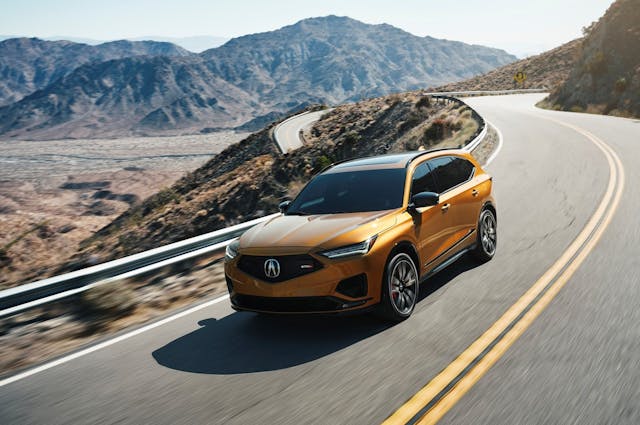
Intake: Production of Acura’s MDX Type S is underway at the brand’s East Liberty, Ohio, plant. This high-performance MDX is intended to appeal to those in search of a family hauler that can still deliver a sense of driving enjoyment from behind the wheel. To aid in the endeavor, Acura equipped the MDX Type S with a 355-horsepower turbocharged V-6, adaptive air suspension, Brembo front brakes, and stylish 21-inch wheels. It’s the second Type S-badged vehicle to arrive from this self-proclaimed “renewed era of Type S performance,” following the TLX Type S sedan that was unveiled in the middle of last year. The two will be joined by the widely-anticipated, limited-production NSX Type S early next year.
Exhaust: Yes, it’s a stretch to consider a seven-seat SUV a prime candidate for a sporting upgrade. Heft aside, the MDX is a solid vehicle as-is, and if the abundance of Mercedes-AMG, BMW M, and Ford ST-branded high-riders is any indication, there’s a market for such a vehicle. In all likelihood, the MDX Type S will sell better than the TLX. If we’re offering up candidates for the next Type S-ification, we humbly suggest the forthcoming Integra.
Toyota sends the Avalon off with special XSE Hybrid Nightshade edition
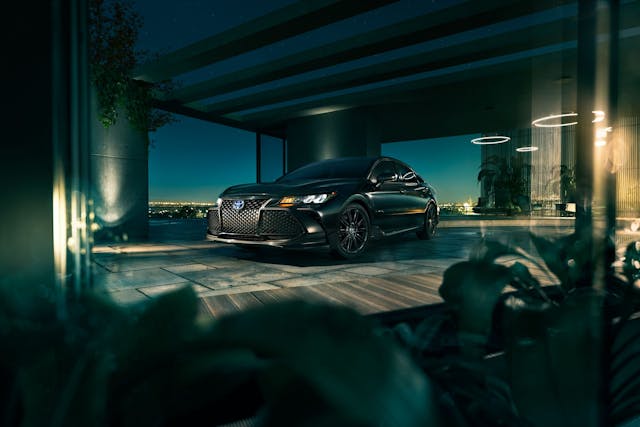
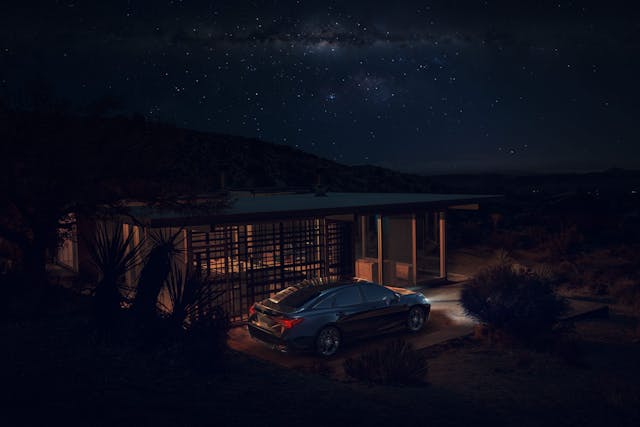
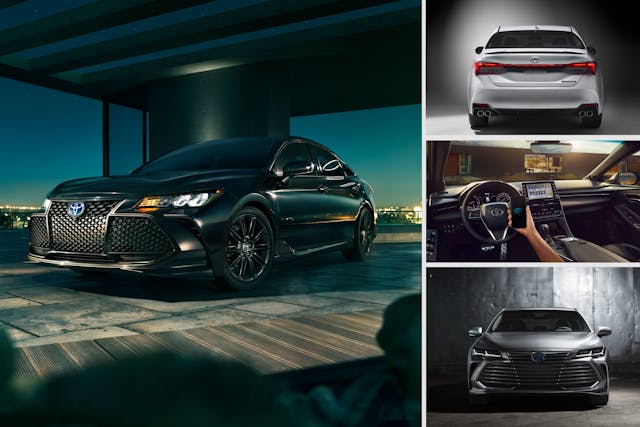
Intake: While Toyota’s Avalon sedan will soon be discontinued, the marque isn’t letting the full-sizer go down without a bit of flair. The 2022 Avalon XSE Hybrid Nightshade edition will send the competent if aging cruiser out with a splash of sporty appearance. A piano-black mesh grille, grade-specific lower diffuser, gloss black wheels, and blacked-out exterior bits such as the side mirror caps, headlight bezels, trunk lid spoiler and exterior badging will aim to spice up the car’s looks. Paint options consist of Midnight Black metallic, Wind Chill Pearl, or Celestial Silver Metallic. There’s a similarly blacked-out feel in the cabin, with black leather and suede adorning seating surfaces and headliner. The XSE Hybrid Nightshade pairs a 2.5-liter four-cylinder with a continuously-variable transmission and a 259-volt lithium-ion battery pack for an EPA estimated 43 MPG city/highway/combined. Starting price for this special-edition Avalon? $41,725.
Exhaust: On the one hand, the death knell for yet another full-side sedan comes as a blow to those of us who view the crossover-laden market of today with a bit of disdain. On the other hand, the Avalon has never really been all that thrilling; it embodies the most conservative aspects of Toyota’s notoriously conservative product planning tendencies. This special edition doesn’t really do much to change that, nor does it really fit the Avalon’s usual discount-Lexus-ES vibe. If a Toyota sedan is a must-have for you—fiscally responsible folks are now tipping their caps—there’s still the Camry.
NHTSA steps up probe into Hyundai and Kia engine fires
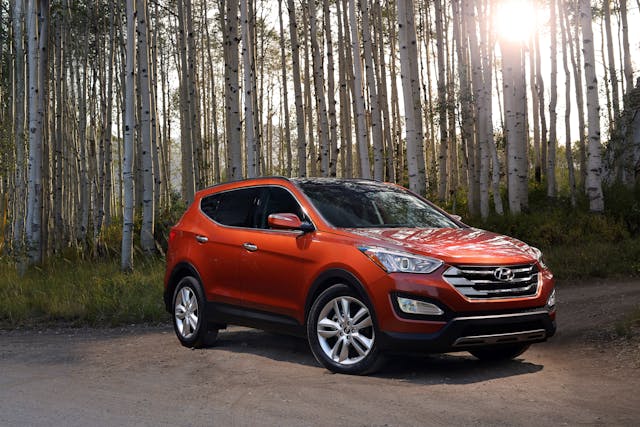
Intake: The National Highway Traffic Safety (NHSTA) is ramping up efforts to investigate a plethora of engine fire issues that have hampered Hyundai and Kia products for over six years. According to Automotive News, the NHTSA has opened an “engineering analysis” to study some 3 million vehicles and to investigate how effective the existing recalls from the Korean automakers have been in remedying the issue. The engineering analysis is the next step in a process that could eventually result in a formal recall being issued, but AN noted that it’s also possible that the analysis closes the probe without requiring further action. Hyundai told AN that it continues to fully comply with the NHTSA investigation into these non-collision engine fires.
Exhaust: Fires are not something to take lightly—even more so if they’re occurring in the context of unprompted engine failure outside of any collision. If you’re having a bit of deja vu reading this, there’s a good reason why: In late 2020, Hyundai and Kia agreed to a $210 million U.S. auto safety civil penalty for recalls of 1.6 million engines due to, yes, fire risks. If NHTSA deems that those recall efforts weren’t effective and timely enough for such a large swathe of vehicles, there will be a hefty fine to pay.
The post The last Grand National heads to auction, showtime for Acura’s MDX Type S, Nightshade edition closes out Toyota’s Avalon appeared first on Hagerty Media.
]]>
The Krinke family has been farming the same land in North Dakota for more than a century. In Neil Krinke’s many years of running the place, he’s grown a lot more than crops. He also collected a huge number of cars and trucks.
Now it’s time to bring the harvest to market.
In a massive automotive sale that has become something of a VanDerBrink Auctions trademark, the Krinke Collection of nearly 100 vehicles and antique tractors—along with engines, parts, signs, fuel pump globes, and other automobilia—will be auctioned on September 18. The sale will be held on the Krinke farm, located 14 miles north of Scranton, North Dakota. There is also online bidding available, which is already underway.
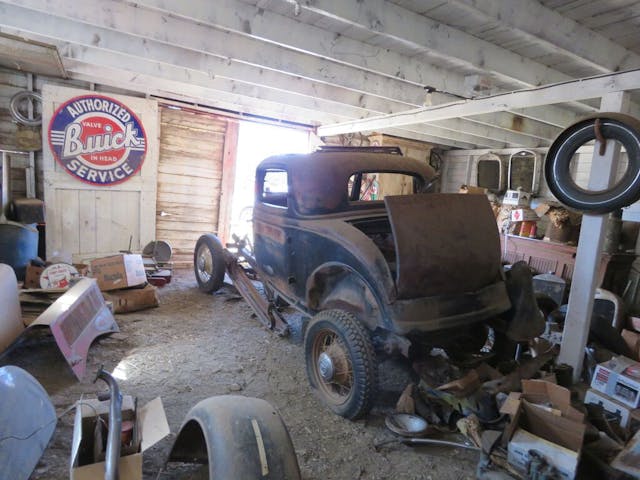
Born in 1932, Neil Krinke grew up working the farm with horses, and he was thrilled when his family bought its first tractor, an Allis Chalmers. Kids tend to grow up quickly on the farm—out of necessity—and at the age of eight, Neil had already mastered operation of a 1928 Chevrolet grain truck. He drove crops in from the field despite barely being able to see over the dash.
Neil’s father was a mechanic, and Neil was fascinated by how his dad “could make something out of nothing” when it came to cars. (No doubt this was a skill developed from lean years when the crop wasn’t ideal.) That fascination led to Neil’s love for automobiles and how they work.

Upon graduating from high school, Neil bought his first car, a 1949 Pontiac. He soon added a 1929 Ford Model A, and he was driving that car when he met the woman he would marry, Rosalie. The couple (and eventually, their three sons) worked hard to make a living on the family farm, and in Neil’s free time—what there was of it—he gained a reputation in the area as a big car guy. If a car was for sale nearby, it didn’t take long for Neil to hear about it. He particularly loved the style of Fords from his birth year, 1932, into the 1940s. A member of the early Ford V-8 club, Neil bought a 1941 Ford and spent six years restoring it.
He also got into hot rods, and there were plenty of dry western Dakota cars to choose from and mod out. Neil says he bought most of his vehicles “within a 50-mile radius” of his ranch.

As you might have guessed already, Neil Krinke has always been more of a buyer than a seller, so his projects began to stack up. When he and Rosalie retired in 1998 and left the farming to their sons, they planned to spend time “seeing the world” in their favorite 1930s and ’40s Fords. Neil’s retirement didn’t last long, however, as he wanted to lend his sons a hand during the transition. He and Rosalie still managed to drive their beloved Fords to club gatherings.
As the Krinkes grew older and began to slow down, their sons encouraged their dad to part with the majority of his cars and allow other people enjoy them. That’s when Yvette VanDerBrink arrived on the scene, and she soon learned the enormity of the Krinke Collection.
“While doing inventory, the memories came back and the stories started flowing about acquisitions and adventures,” she says. “The collection also revealed so much history of the area and its people. For every car, Neil had the story of who had it and when he got it.”
Auction highlights include that ol’ 1929 Model A, which was Rosalie’s favorite. She drove it one last time while VanDerBrink inventoried the collection. Also headed to auction are a 1932 Ford Coupe project that was found in a neighbor’s barn, several rare 1932 Ford Victoria Sedans, and restored, award-winning cars like a two-door 1934 Ford Victoria Sedan, 1936 Ford Cabriolet, 1934 Ford Roadster, and 1940 Ford Coupe.
In addition to the Fords, the sale includes a hard-to-find 1950 Mercury Convertible, a 1957 Ford Fairlane 500 Skyliner Retractable Convertible, a 1964 Mercury Montclair Marauder Hardtop that the family has owned from new, a five-window 1954 Chevrolet 3100 Series pickup truck, a 900+ AACA Junior and Senior Award-winning 1957 Chevrolet Bel Air Convertible, and a 1950 Pontiac Chieftain Convertible.
The Krinke Collection has something for every enthusiast and every budget, from memorabilia, parts, projects, and tractors to beautiful ready-for-the-road classics. Looks like the Krinke farm has produced another bumper crop.
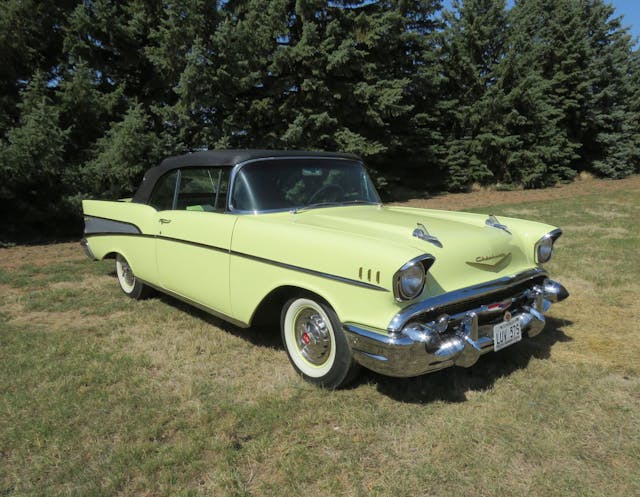
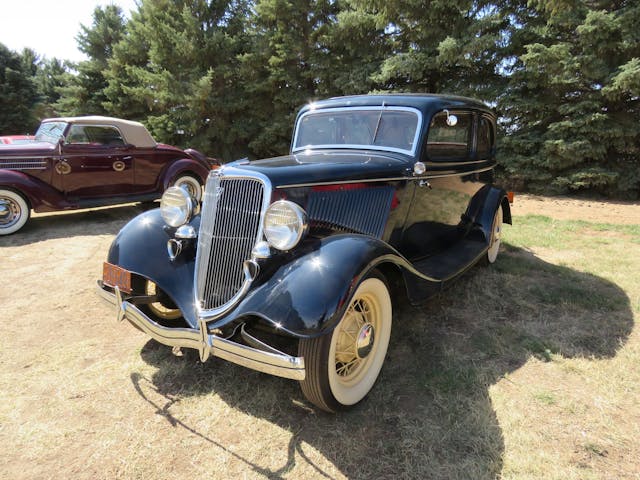
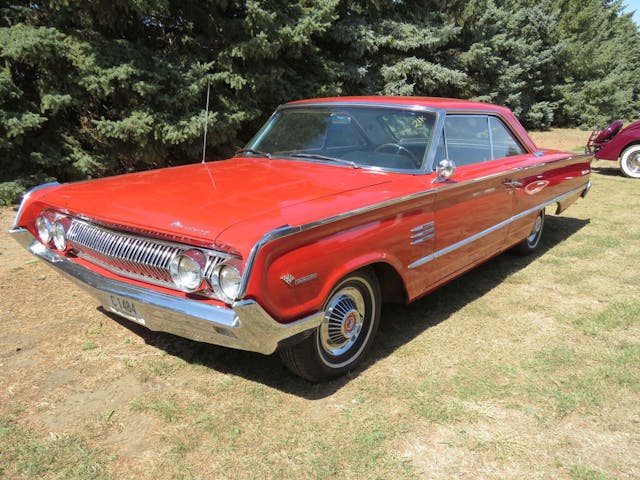
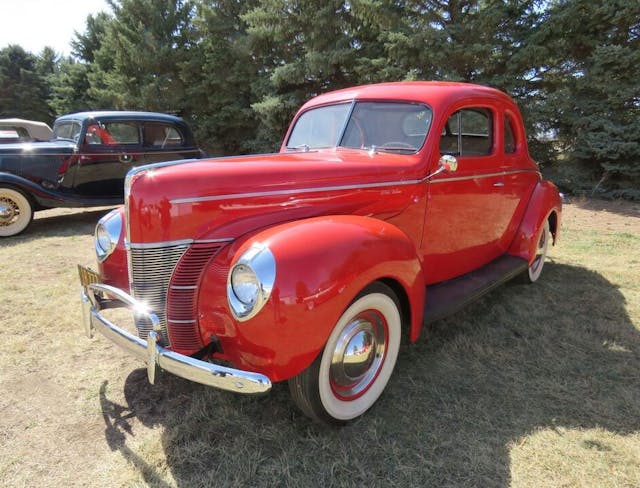
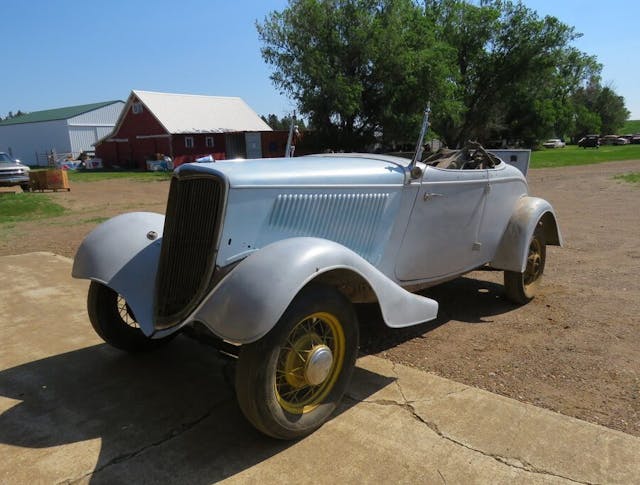
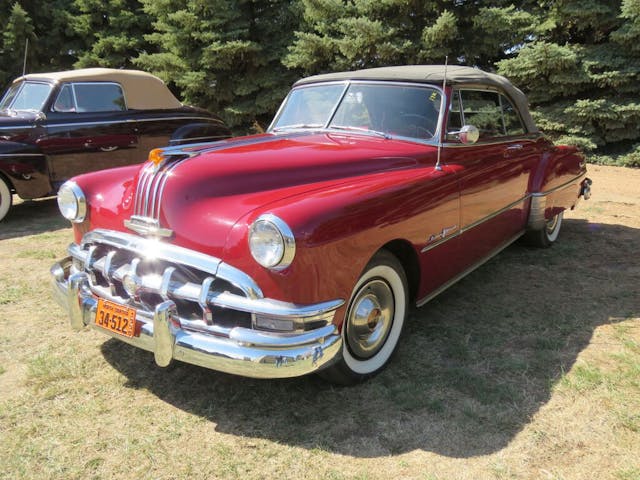
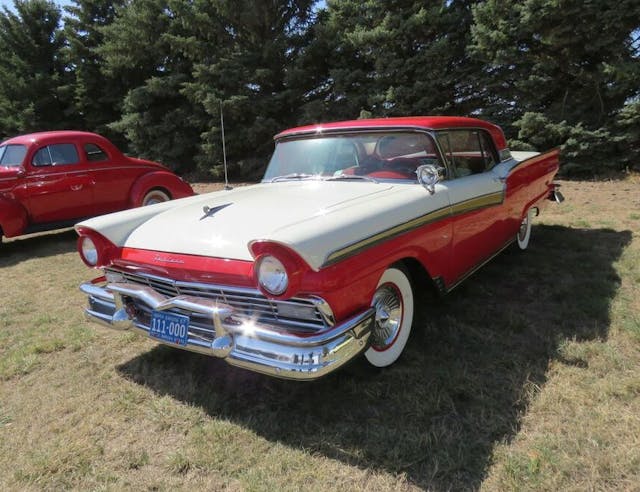
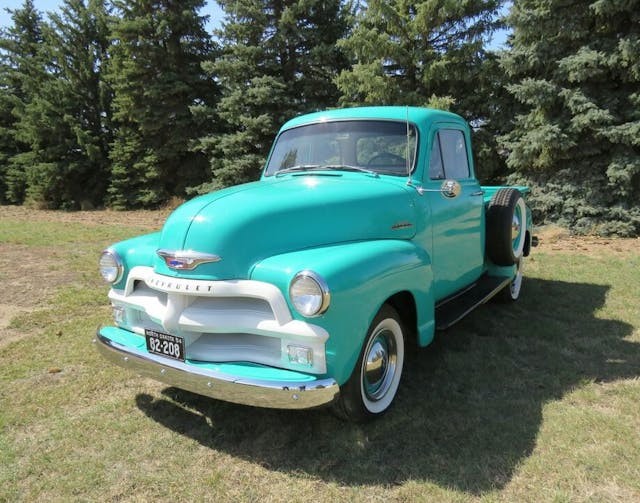
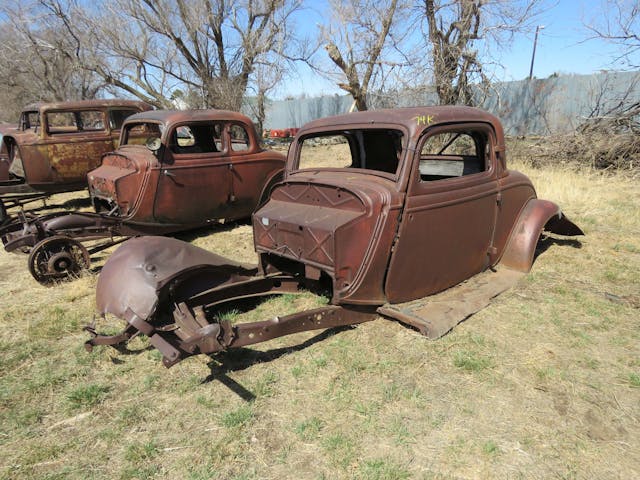
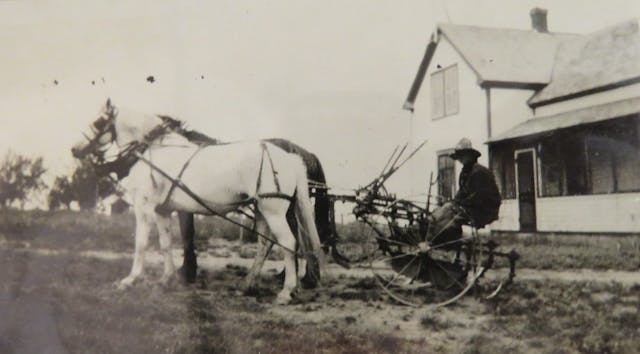
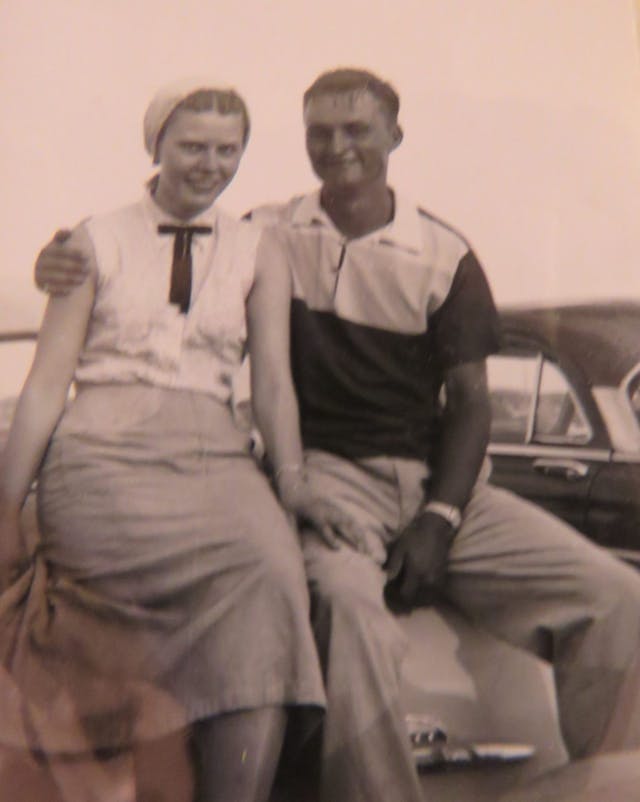


The post North Dakota farmer is bringing a bumper crop of classics to market appeared first on Hagerty Media.
]]>
Ram built just 702 copies of its TRX Launch Edition, one for every horsepower of its supercharged 6.2-liter V-8. That angry Hemi makes the TRX the quickest and most powerful production pickup ever offered from the factory. Buyers were so eager to snatch up every one of those 702 special editions that orders were filled up in about three hours. Well, not every one got snapped up. Ram held back one—the first one, TRX no. 001, for a charity auction set for March 26 at Barrett-Jackson’s Scottsdale 2021 event.
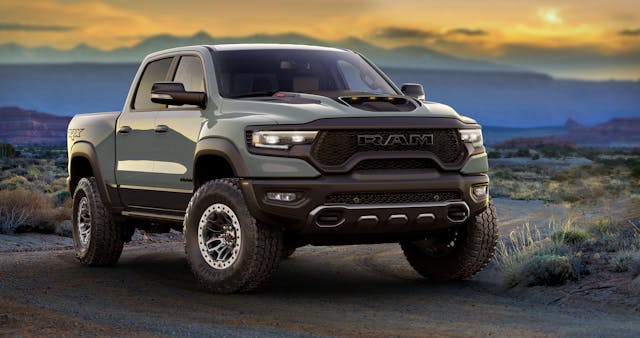
Ram’s CEO, Mike Koval, Jr., is excited that Ram is offering the high-flying, long-travel, desert-taming Ram. He adds: “More importantly, we expect this first production Ram 1500 TRX to raise significant funds that will go directly to the United Way for Southeastern Michigan’s 2-1-1 helpline to provide services to veterans and their families.”

The Ram RTX went into production in December, and those first Launch Editions started at just over $90,000. Those fully decked-out models carried a significant premium over the “standard” TRX, which starts at $69,995. VIN no. 001 is finished in Anvil Gray, exclusive to the Launch Edition, with a red and brushed-aluminum interior and a 19-speaker Harman Kardon audio system. In addition to its loaded option sheet, this TRX also benefits from Mopar accessories like the RamBar, rock rails, and a bed-mounted spare tire carrier.
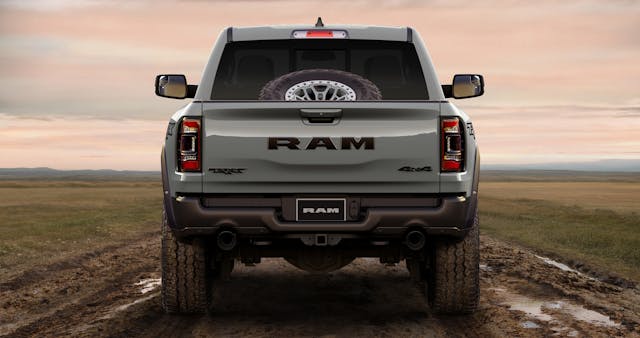
Barrett-Jackson is waiving all auction fees for this special occasion, so the full auction price will go straight to United Way for Southeastern Michigan’s 2-1-1 helpline, the largest in the state, which answers more than 700 calls per day. As if that weren’t enough to sweeten the deal, besides the beastly pickup, the auction winner will take home a presentation box that comes with a book chronicling the development of the first-ever TRX, a stylized model of pickup, and a truck cover that was designed in partnership with the vehicle’s design team.
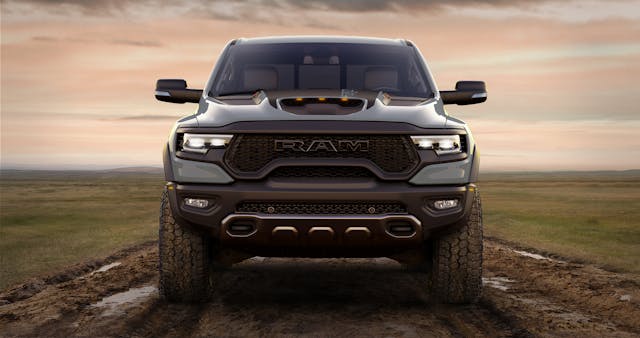
Koval adds: “At Ram, we offer unique ‘Built to Serve’ editions of our Ram 1500 pickup as a way to honor all those who serve or have served in the U.S. armed forces with distinction. This is an important mission at Ram, and this auction is another way we can honor our veterans.”
Barrett-Jackson’s Scottsdale Auction will be held at Westworld of Scottsdale from March 20–27. VIN no. 001 TRX will be on display the whole time, in case you plan on visiting in person. If you’re interested in bidding on one of the meanest pickups the desert has ever seen, you can visit Barrett-Jackson’s website, register to bid, and help a worthy charity in the process. If the TRX is out of your budget, there’s also a link to donate directly to United Way for Southeastern Michigan’s 2-1-1 helpline.
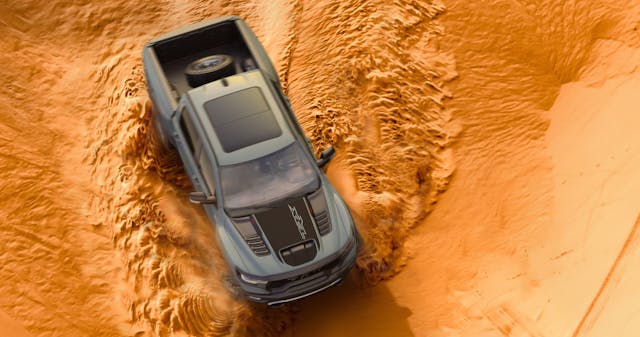
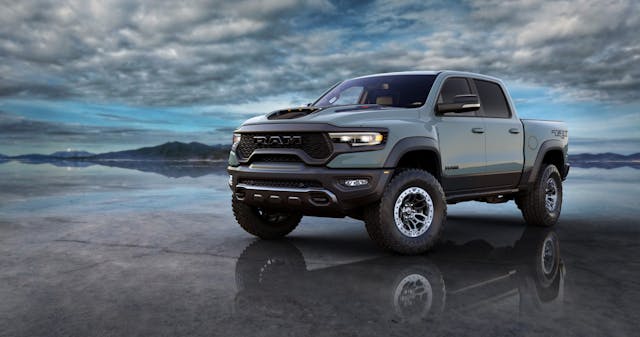
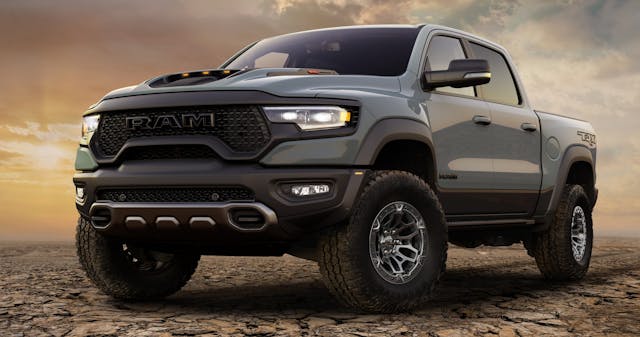
The post Ram TRX no. 001 will start life by doing some good in the world appeared first on Hagerty Media.
]]>
Jaguar’s revolutionary D-Type melded an aluminum monocoque chassis with a stirring DOHC inline-six powerplant—and a gorgeously curvy body. The race car left no guessing as to its ambition, as its body was carefully sculpted to slip through the air. D-Types continued the racing success of its C-Type predecessors, winning the 1954 Sebring 12 Hours and taking second in the 24 Hours of Le Mans the same year. Jaguar followed up with the overall Le Mans win in 1955, and the Scottish team Ecurie Ecosse used a D-Type to take the win again in 1956. Two privateer D-Types from Ecurie Ecosse, along with a French and Belgian team, would go on to sweep the first four positions at the 1957 24 Hours of Le Mans as well, cementing the D-Type’s endurance racing legacy.

This example from 1955, chassis number XKD 518, is being offered by RM Sotheby’s at its January 2021 Arizona sale. The car’s listing suggests that perhaps its rare red-over-red combination was an attempt to woo potential Italian privateer racers who didn’t feel that British Racing Green was quite appropriate. No matter the reason, this striking racer was slow to sell initially but was eventually raced by Peter Blond, who purchased the car from Bernie Ecclestone. Blond raced the car in 1956 and 1957, winning club races at Snetterton.
The car’s provenance is well-documented and includes Led Zeppelin manager Peter Grant. At some point it was painted British Racing Green, but since 2008 it has been in the collection of its current owner and has been returned to its proper, original red shade. The single vertical fin behind the driver headrest adds stability, along with a bit of aircraft styling flair. Consistent with early D-Types, the fin was not on the car as it was originally built, being added at some point during its racing career to match the fin that Jaguar later added to its factory D-Type racers.
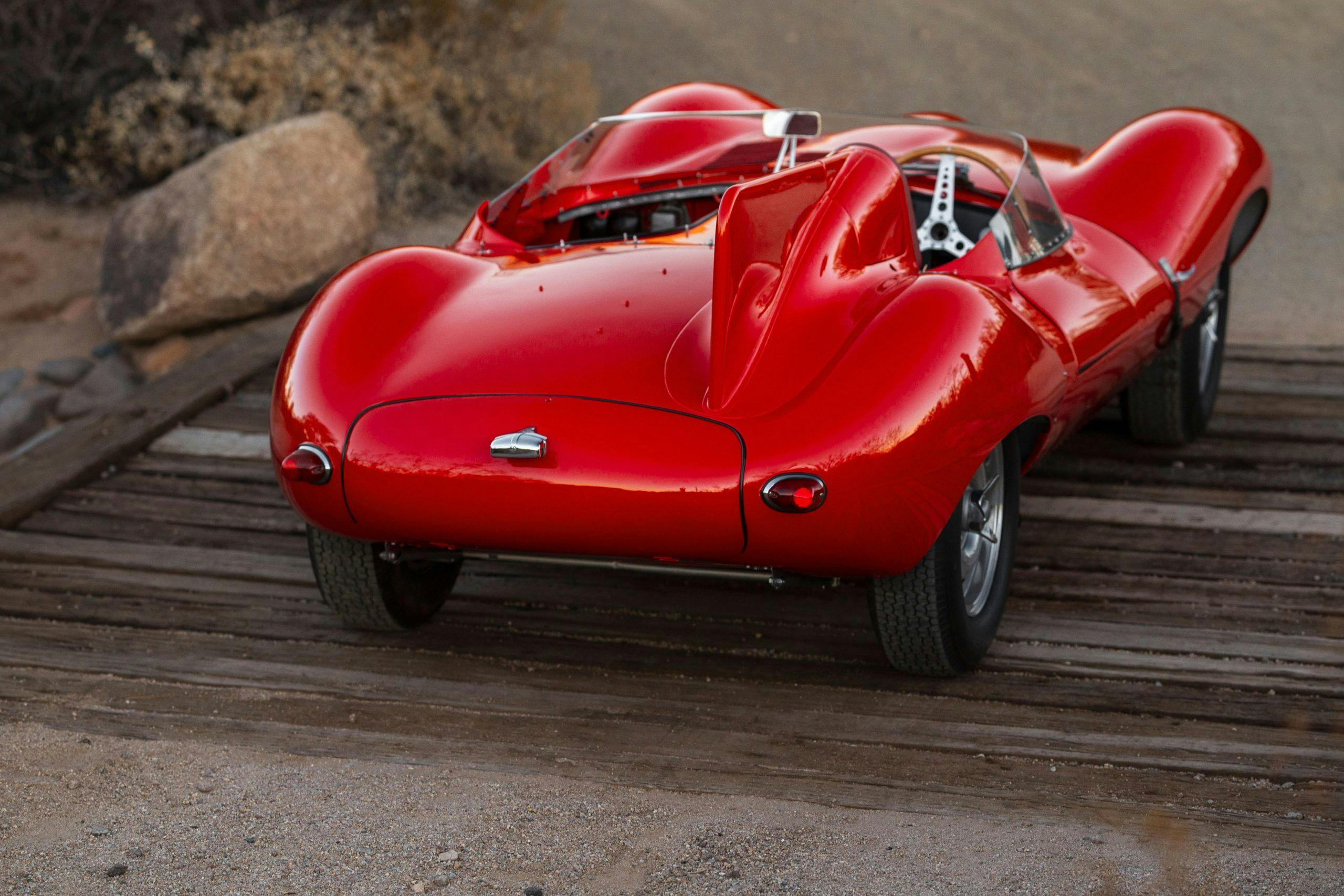
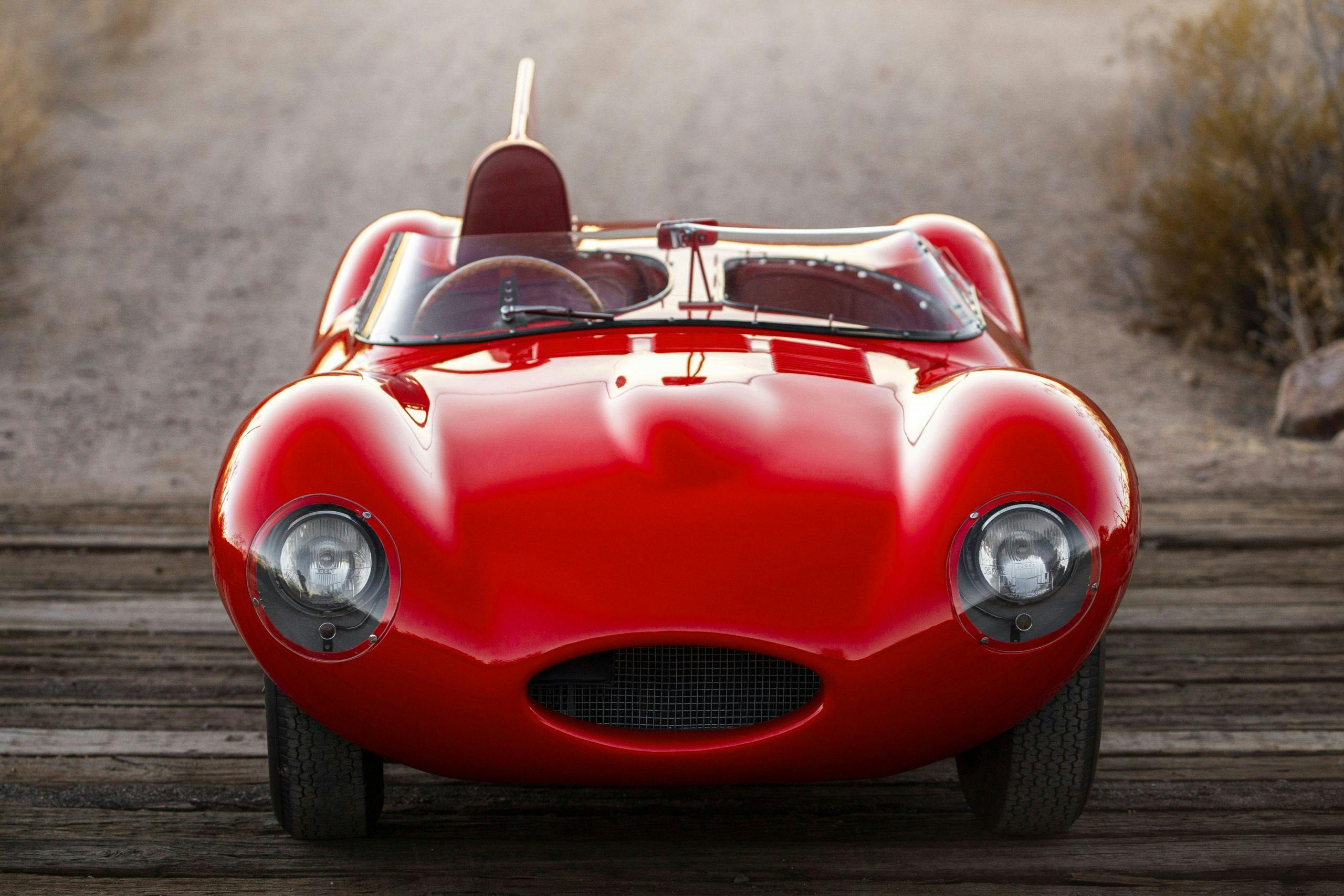
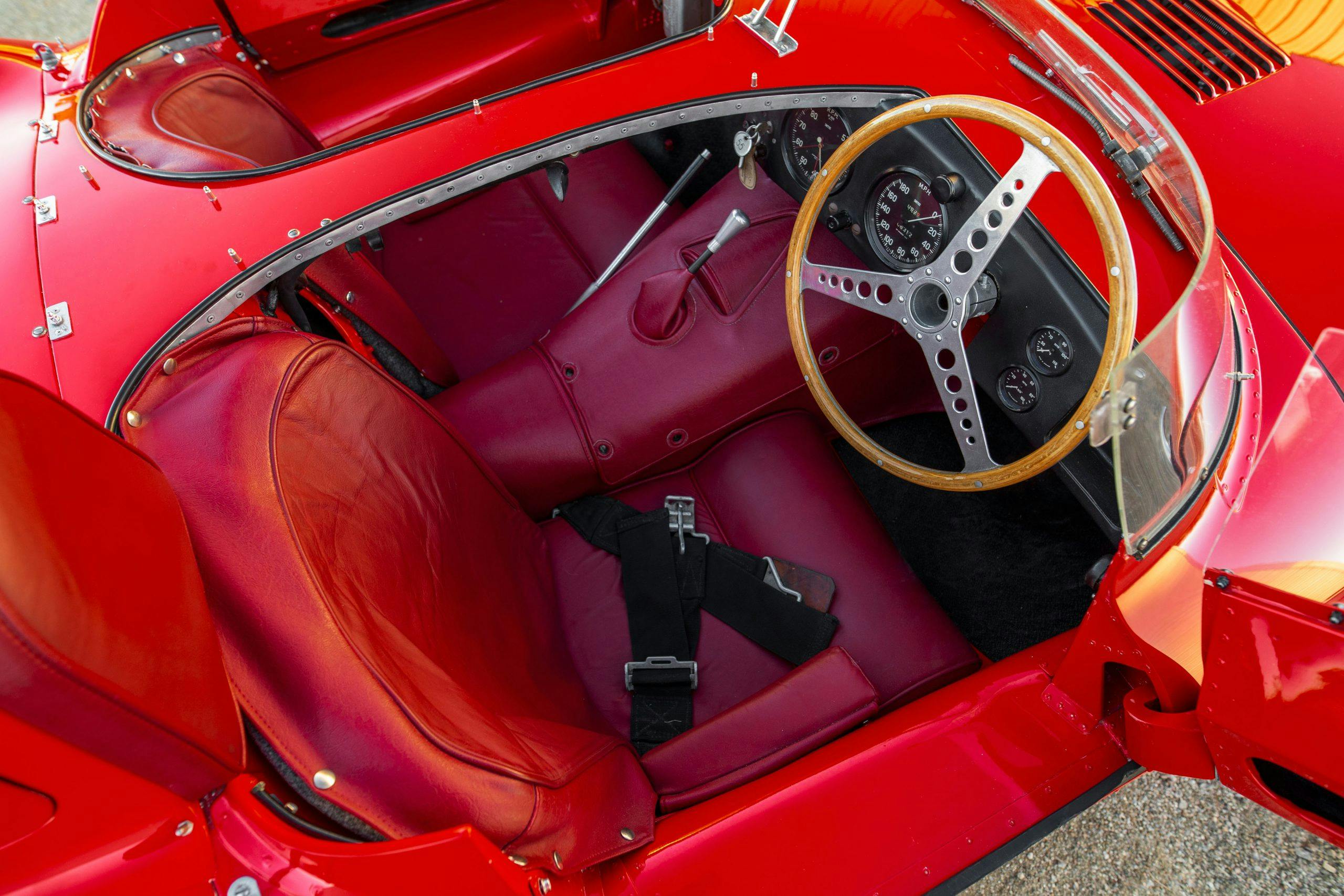
We spoke with RM Sotheby’s Ian Kelleher, who estimated this spectacular sports car will sell for between $5,750,000 and $7,500,000. That puts it right in line with our valuation for a 1955 D-Type in #2 (Excellent) condition. Only a few of these early D-Types have been auctioned lately and even those without a racing pedigree, like the continuation cars, have sold for more than $1,000,000.
This period-raced British classic would be right at home at a vintage race or as the stunning centerpiece to any collection. With the red-on-red color combo, it may even fly under the radar at the Concorso Italiano, if only for a minute.

The post Race-winning Jaguar D-Type could sell for $7.5M appeared first on Hagerty Media.
]]>
The second production 2005 Ford GT is heading to the auction block for RM Sotheby’s online-only Open Roads sale November 11-20. Even in the world of limited-production ’05-’06 GTs, this early example is a significant piece of history that will surely be on collectors’ radar.
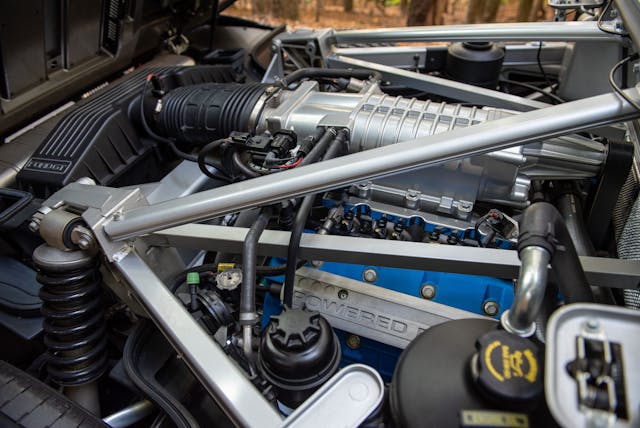
Powered by a 550-horsepower supercharged V-8 situation behind the seats, the supercar was a celebration of the Le Mans racers that cemented Ford’s racing status on the world stage. Just over 4000 were built. The first nine production GTs were set aside for internal sale to select Ford employees and family members. This one, number 02, was purchased at a charity auction in August 2003 by 21-year veteran Ford board member Michael Dingman and delivered a year later along with the first production GTs that came late in 2004. Mecum notes that chassis number 01 is probably in Ford Motor Company’s collection and won’t be leaving any time soon, making this the lowest-numbered Ford GT likely to be available to the public.
The three previous owners have taken excellent care of this GT and have accumulated a total of 250 miles on the odometer. As shown in the photos, it looks as though it could have rolled off the assembly line yesterday.

Not only does its early production and perfect condition make it desirable, but the car also wears all of the preferred options that GT collectors look for: racing stripes, the McIntosh audio system, painted brake calipers, and BBS aluminum wheels mounted with Goodyear Eagle F1 rubber.
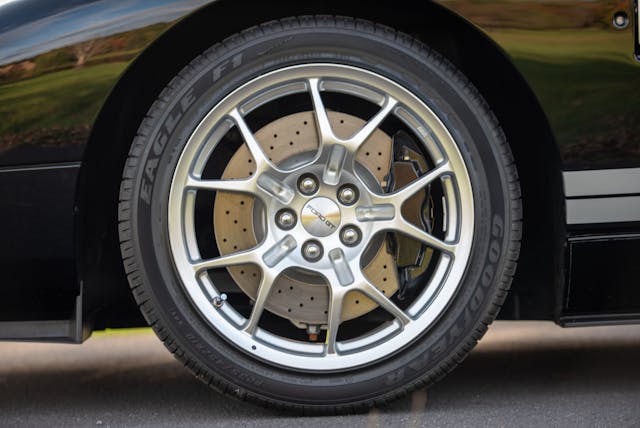
We looked into this car’s sales history. In 2012, it sold for $242,000, which was 27 percent higher than its #1 (Concours) value at the time. Applying that same premium to today’s GT values, and we could see this stellar example approach $500,000. RM Sotheby’s is estimated $500K-$600K.
The new GT may be significantly more powerful and considerably more technologically advanced, but this V-8-powered machine has styling more in line with the original, unobtanium GT40s and a more analog driving experience. Of course, with just 250 miles on the odometer, the next owner may not want to rack up the miles unless they see this as an alternative to the newer, V-6 GT. Either way, we won’t have long to wait to see if this desirable collector makes waves and becomes the most expensive retro GT ever sold.
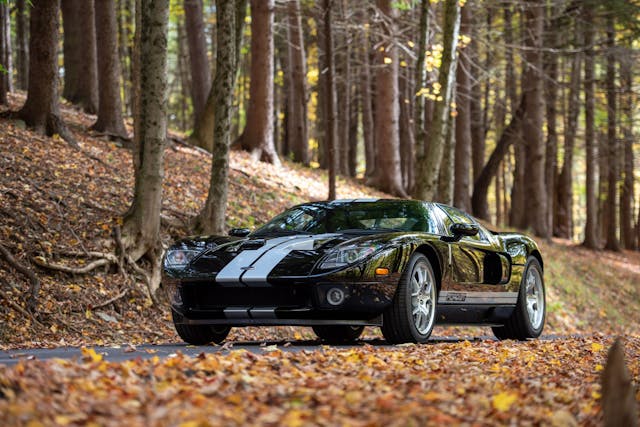
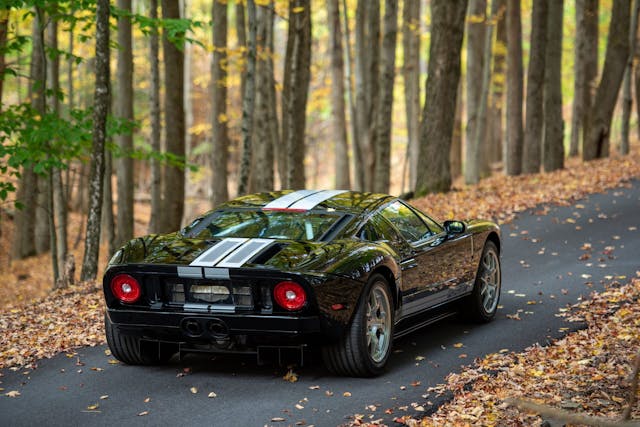
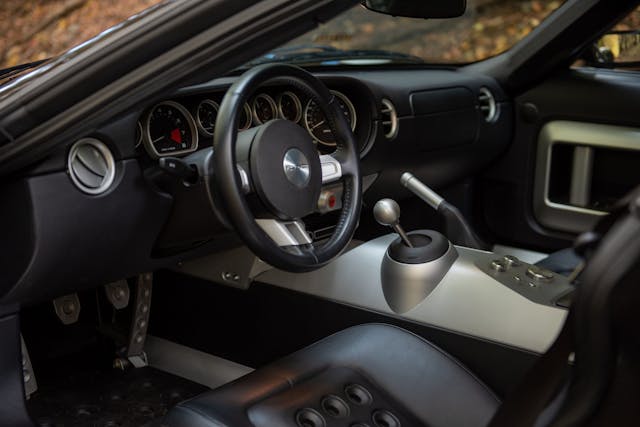
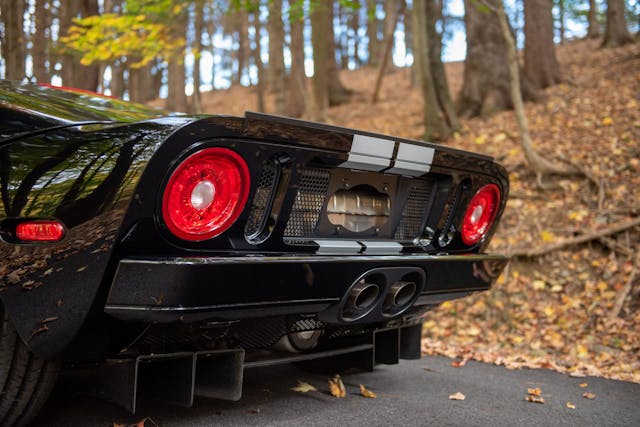
The post 250-mile Ford GT #02 could sell for $500K appeared first on Hagerty Media.
]]>
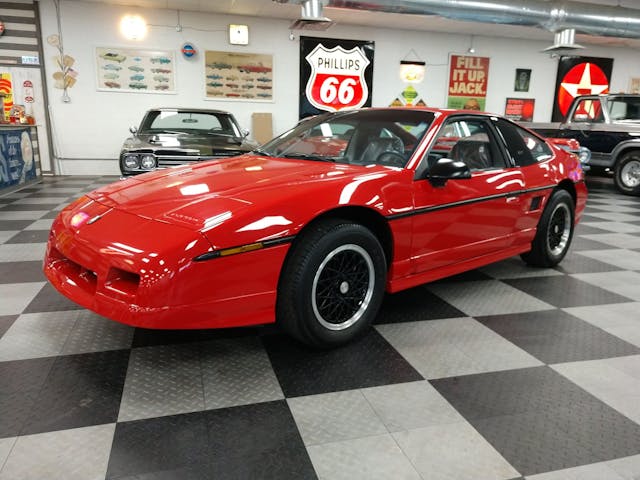
America’s first mid-engine production car, the Pontiac Fiero, was introduced 36 years before the mid-engine 2020 Chevrolet Corvette became the darling of the automotive media. Although early iterations of the 1984–88 Fiero took a lot of heat (much of it justified), loyal enthusiasts still lament the sports car’s passing, especially since the Fiero was finally meeting expectations—in build quality and performance, not in sales—when Pontiac pulled the plug.
The last of 370,168 Fieros to roll off the assembly line, a red 1988 GT, is about to cross the auction block. It is one of 650 vehicles being offered at the GAA Classic Cars Auction November 5–7 in Greensboro, North Carolina. Only registered bidders and consignors will be permitted to attend.

Fiero s/n 226402 was built on August 16, 1988 and became not only the final Fiero, but the last Pontiac built in Pontiac, Michigan, as the Pontiac Assembly Plant shuttered for good. Just over 26,400 Fieros were produced in 1988, down from a high of 137,000 in 1984.
The ’88 GT is equipped with a 135-hp, 2.8-liter V-6 (mated to a three-speed automatic transmission), a far cry from the 92-hp, 2.5-liter “Iron Duke” four-banger found in introductory models. Options on the car include air conditioning, cruise control, power doors and mirrors, sunroof, and rear spoiler. Sticker price was $16,853.
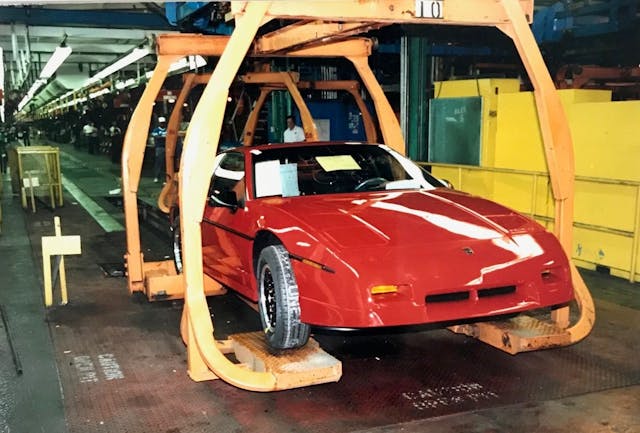
The final Fiero went to Pontiac Assembly Plant employee Mike Kelley, who won it in a raffle and has remained the car’s sole owner. It has only 582 miles and still wears its pre-delivery plastic. The car comes with extensive documentation, including build sheet, assembly line photos, newspaper articles, books, and all original paperwork.
GAA has not provided a pre-auction estimate, but it seems likely that the historic Fiero will sell for more than its current #1 (Concours) value of $19,600. How much more depends on how many Fiero aficionados are compelled to fight for it. Here’s your chance to own a practically brand-new 1988 Pontiac Fiero GT, 32 years after missing out on it the first time.
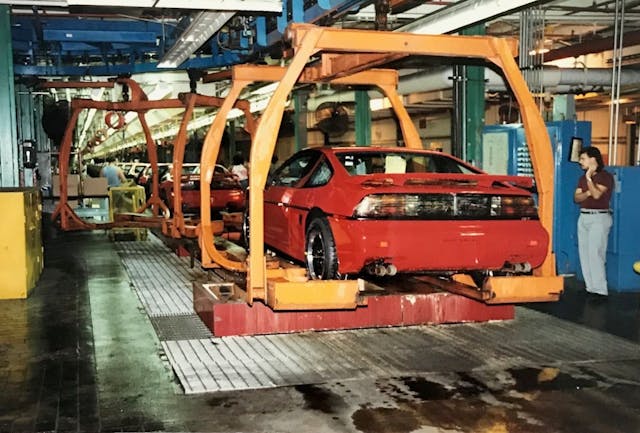
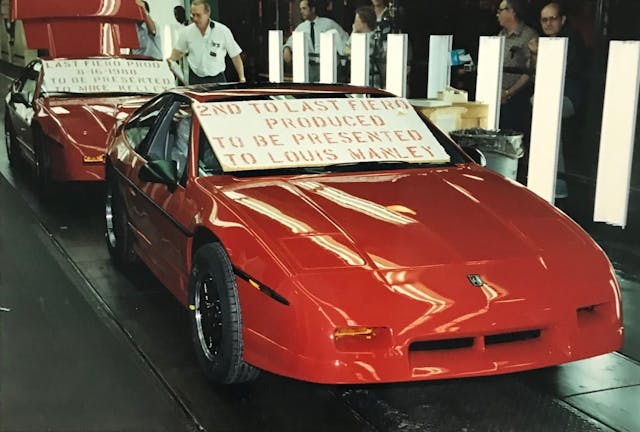

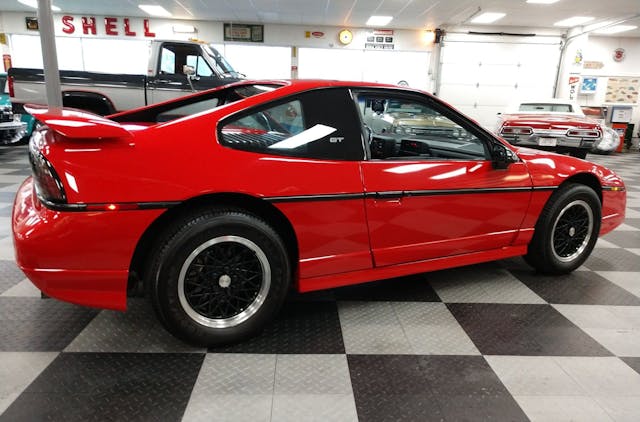
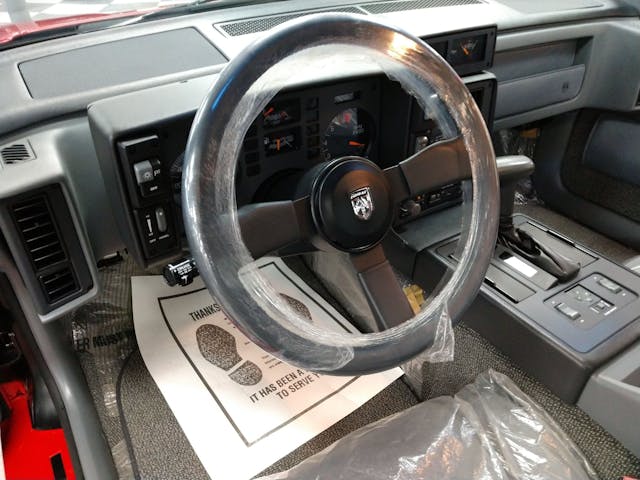
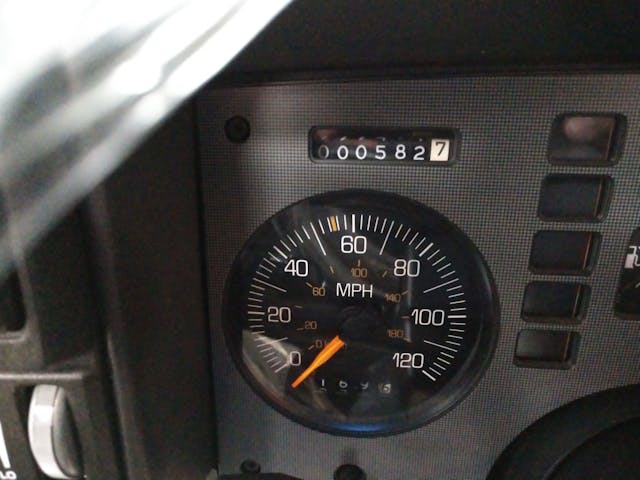
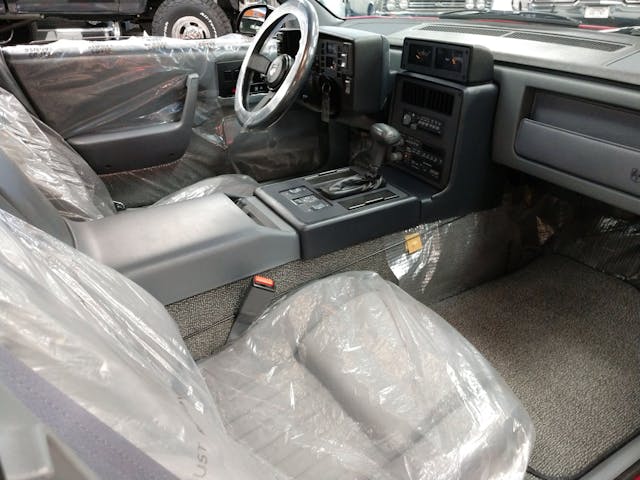
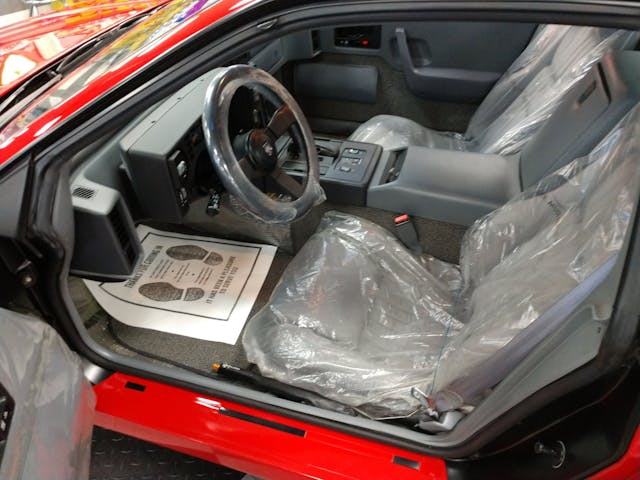
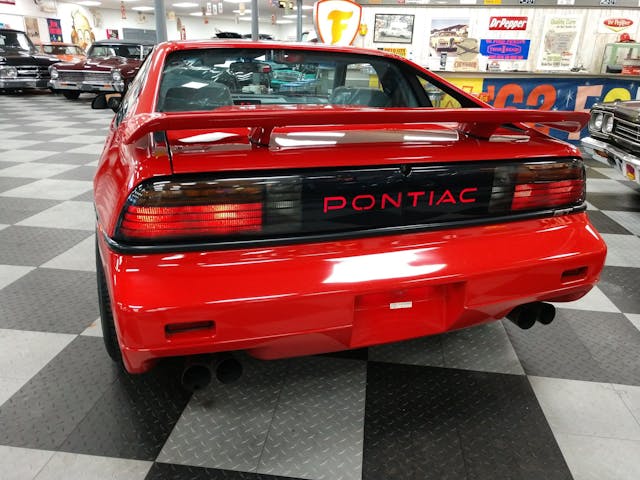
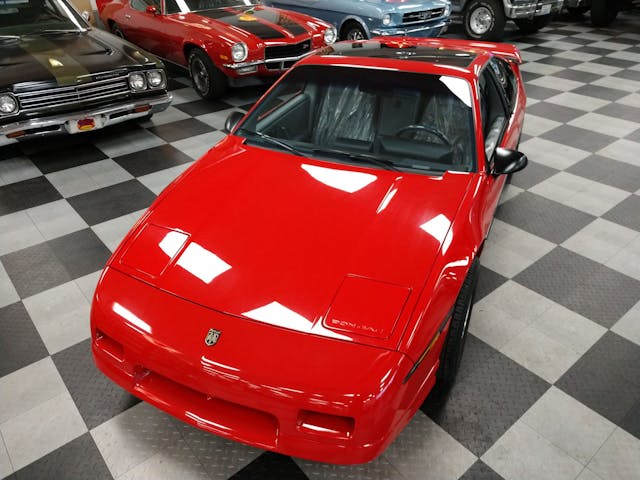
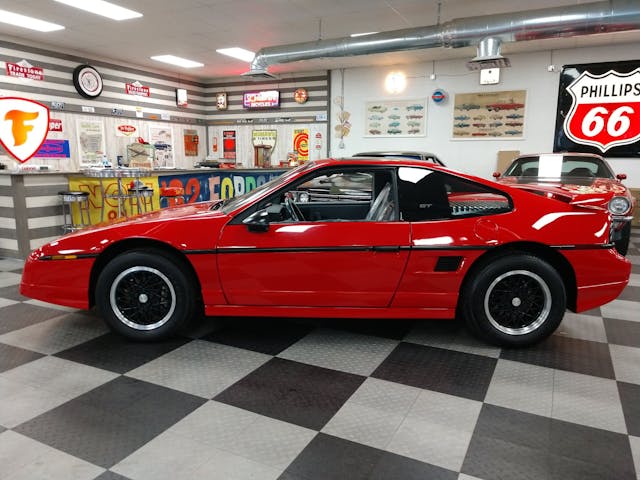
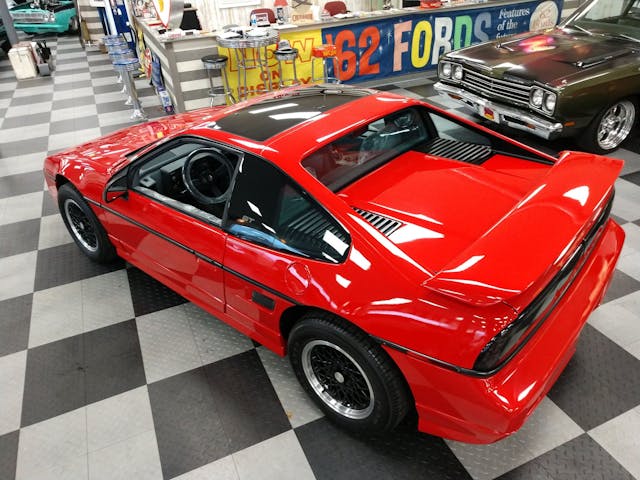
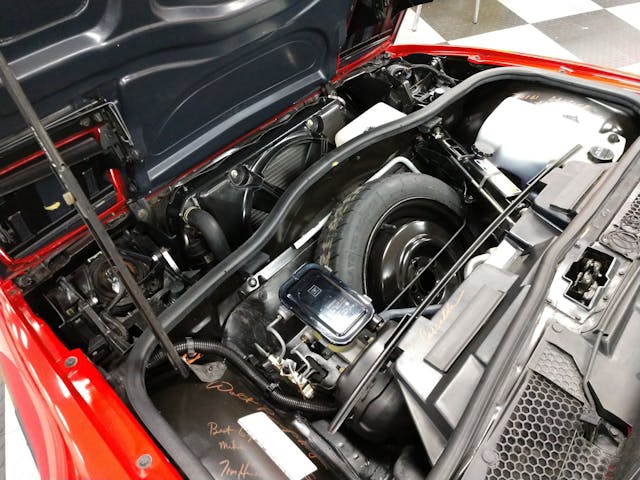
The post The final Pontiac Fiero, still plastic-clad, could be yours appeared first on Hagerty Media.
]]>
It’s likely a familiar refrain by now, but we’re living in a different world than we were just a few weeks ago. With delays and cancellations for everything from Miami Music Week and South by Southwest to Major League Baseball and Formula One, plans have changed for everyone this spring, even if you’re fortunate enough to be safe and healthy.
Our little world in the collector car hobby is similarly affected, as the auctions we looked forward to covering over the next couple of months are either canceled or postponed. For example, Barrett-Jackson has moved its April West Palm Beach auction to October 15, and Bonhams will hold its March 29 Goodwood sale behind closed doors with increased absentee bidding.
RM Sotheby’s, on the other hand, is taking a different approach in these volatile times, moving its own Spring 2020 Palm Beach auction to an online, multi-day format. (The auction was originally scheduled to take place at the Palm Beach International Raceway.) Bidding is live now as of 11:00 a.m. on Friday, March 20. A staggered closure on available lots begins at 11:00 a.m. on March 25. About 80 percent of the 225+ vehicles on offer carry a reserve.
RM started its “Online Only” division last year and has sold memorabilia, posters and cars through the platform, so this isn’t uncharted territory for the auction house. In addition, the list of consignments for Palm Beach 2020 is the usual mix of neat cars and trucks we’ve seen at this sale year after year. That variety means something for every taste and budget. There is entry-level fun like a 1979 El Camino SS and 1981 Toyota SR5 Pickup as well as heavy-hitting high-dollar dream cars like a 2005 Porsche Carrera GT, 2017 LaFerrari Aperta, 1996 Porsche 911 GT2, and 1963 Shelby 289 Cobra. There are also fun oddballs like a 1958 MG Magnette and a 1948 Allard K1 up for grabs.
We may be in front of our computer screens instead of soaking up the sun down in Florida, but we’re still watching this auction intently. If Amelia Island 2020 was the last of the pre-COVID-19 collector car auctions, then Palm Beach is the first test of our new normal. Keep an eye out for our analysis of the sale here.
The post RM’s Palm Beach auction moves to online-only, but the cars are still sweet appeared first on Hagerty Media.
]]>
Results from the Amelia Island auctions last weekend normally would be the biggest thing on our minds here at Hagerty (total sales were down only 3 percent, despite there being one fewer auction house present). But even in the bubble of collector cars, concerns about COVID-19 and its impact on the health of the world’s population and economy are hard to ignore.
Although the health of the collector car market might not be a major concern of yours right now, it is our area of expertise. We have, over the years, constructed a model—represented by the network graph pictured here—to determine what factors are important to the collector car market, and which ones aren’t. (The thicker the arrow, the greater the impact.) Typically, the collector car market responds to the following economic factors:
- The stock market
- The price of oil
- Residential real estate
- Unemployment
- Auto loans

The stock market’s ups and downs will affect the market, but this mainly affects vehicles under $100,000. Be it because people are actually making money on stocks or because they associate the market with economic health, entry-level collector cars rise with the stock market. In other words, you might want to keep an eye on the Dow before you put your ’55 Chevy up for sale, but a Bugatti that’s been carefully stored for decades will probably sell just fine even in a bear market.

The price of oil, on the other hand, is piped throughout the collector car market. Even though everyday drivers appreciate when the price of oil falls, the oil industry employs a lot of people in the United States, Canada, and Mexico. Not surprisingly, some of those people spend their earnings on fun vehicles that consume what they produce.

Residential real estate has a very practical connection with collector cars: owning a residence makes it much easier to own a collector vehicle. Homes and collector vehicles also share many characteristics: high transaction costs, emotional appeal, and high maintenance costs. Every house, like every car, is unique, and they sell for a wide range of prices to everyone from blue-collar workers to the ultrarich. Two key differences: Nobody needs a collector car like they need a place to live, and houses can’t be sold in another state or another country. So, if the real-estate market takes a dive, an effect might be that homeowners sell the classic in their garage.

Unemployment is a brake on the collector car market. People without jobs tend to own a vehicle for transportation and aren’t after a vehicle to fulfill their wants. You might think this, like the stock market, applies mostly to entry-level cars. Yet the effects of higher unemployment extends up the ladder—as customers spend less, business owners feel the pinch.

Auto loan rate increases also slow appreciation in the collector car market. That might seem odd, since the loans we’re talking about primarily apply to new cars, not classics. But the millions of people working for automakers, suppliers, dealers, and the rest of the mobility industry adjust their spending on enthusiast vehicles in accordance with the results of the new car market. Therefore, as lending standards loosen, or new car prices rise, values for collector cars often follow.
Understanding what factors have the biggest impact on the collector car market allows us to model some of the potential impacts of COVID-19. The stock market and the price of oil will likely have the most immediate impact, particularly on the under-$100,000 classics that have powered the market in the last year or so. However, vehicles above that $100,000 price point—think, cars that sell at Pebble Beach—or the parts of the economy not as closely tied to the oil industry, might see little change.
As with residential real estate, if the car isn’t highly leveraged, and there isn’t an immediate need to liquidate, values will likely be stable long-term. Unemployment and auto loan rates will likely have a more gradual impact on the market, and largely depend on how long the crisis lasts. If some semblance of calm returns in a few weeks, there’s no reason to expect significant job cuts or declines in auto sales.
So, if you can afford to hold on to your classic, there’s no reason to sell right now. If you take a long view, it might also be a time to buy. As always, we think the important thing is to buy what you like and drive it often. Given the times, we’ll add that it’s even more important to stay safe. Please follow the CDC guidelines so that we can avoid COVID-19 quarantines and infections and get back to driving.
The post What the coronavirus outbreak means for the collector car market appeared first on Hagerty Media.
]]>





